Research unveils record-breaking ice loss
Acceleration in the melting of Earth’s ice sheets now unmistakable
Northumbria academics have been using satellite data to assess the alarming rate at which ice sheets are melting in Antarctica and Greenland, revealing the greatest loss of ice on record has occurred within the past decade.
Global warming is melting the polar ice sheets which is driving up sea levels and causing coastal flooding around our planet.
Findings by the Ice Sheet Mass Balance Intercomparison Exercise (IMBIE) team reveal that ice mass lost from Greenland and Antarctica’s ice sheets is now responsible for a quarter of all sea level rise – a figure five times higher than in the 1990s.
The IMBIE team, which is led by the Centre for Polar Observations and Modelling (CPOM), based in
Northumbria’s Department of Geography and Environmental Sciences, comprises 68 polar scientists from 41 international organisations.In their latest assessment, funded by NASA and the European Space Agency (ESA), the team combined 50 satellite surveys of Antarctica and Greenland taken between 1992 and 2020 to determine the rate of ice melting. They found that Earth’s polar ice sheets lost 7,560 billion tonnes of ice during this period – equivalent to an ice cube
20 kilometres in height. While the polar ice sheets have lost ice every year of the satellite record, the highest melting rate has occurred in the past decade. 2019 recorded the highest melting rate when the ice sheets lost a staggering 612 billion tonnes of ice.

Polar ice sheet melting has caused a 21 mm rise in global sea level since 1992, almost two thirds of which has originated from Greenland and one third from Antarctica. Should ice
sheets continue to lose mass at this pace, the Intergovernmental Panel on Climate Change (IPCC) predicts that they will contribute between 148 and 272 mm to global mean sea level by the end of the century.

Over the past few years, ESA and NASA have made a dedicated effort to launch new satellite missions capable of monitoring the polar regions. The IMBIE project has taken advantage of these missions to produce more regular updates, known
as assessments. Through the research conducted by the IMBIE team, we are now able - for the first time - to chart the polar ice sheet losses every year.
Continues on page 2.
Summer 2023 • northumbria.ac.uk Issue 29 #TakeOnTomorrow
Cumulative change in ice sheet thickness
Areas in red below highlight changes to the thickness of Greenland’s ice sheets between 1992-2020
IN THIS EDITION SUMMER 2023
SUSTAINABILITY

NORTHUMBRIA CONTINUES TO CLIMB UP THE RANKINGS,

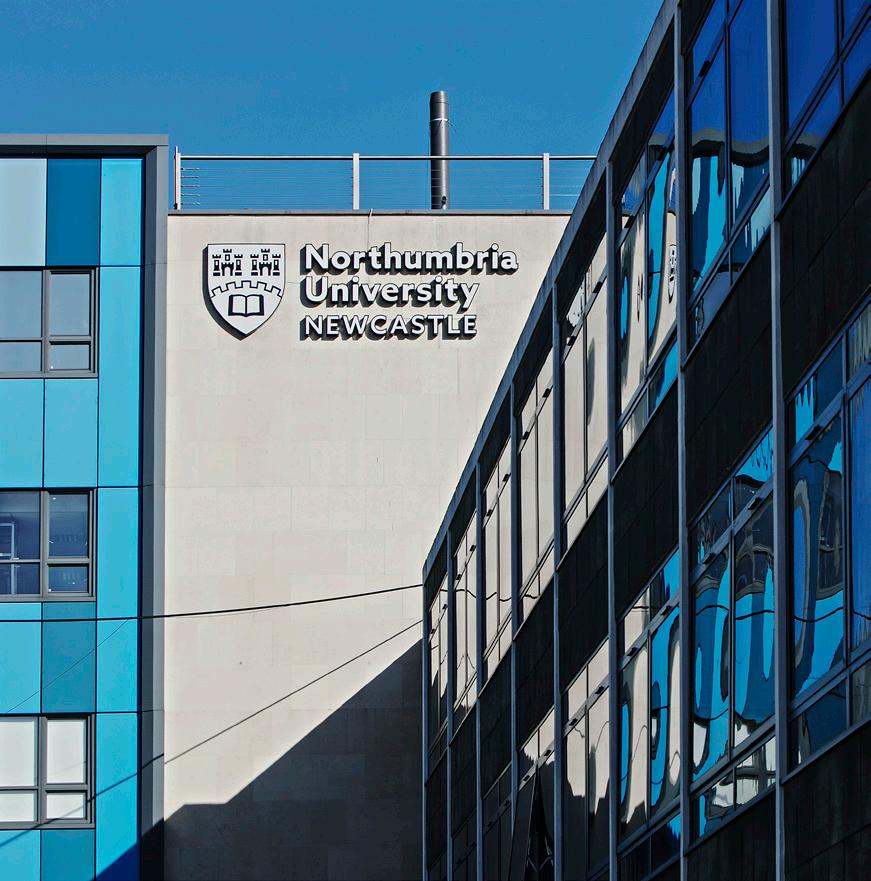
Page 3
THE BIG INTERVIEW:
ECONOMY
Harnessing the healing powers of the sea, page 30
HEALTH
How meat alternative may reduce bowel cancer risk, page 29


Nanojet research breakthrough, page 9
SOCIETY
Success for innovative elderly care programme, page 25
JUSTICE AND SECURITY
New technology to improve police interviews, page 32

SPORT
Northumbria lecturer supports Team GB at Special Olympics, page 36

Tracking record-breaking ice loss
Continued from page 1
Importantly, by using the same methods and covering the same period in time as existing records, their research brings ice loss records from Antarctica and Greenland in line, making them consistent and directly comparable. The assessment will now be updated annually to make sure that the scientific community has the very latest estimates of polar ice losses.
Professor Andrew Shepherd, Head of the Department of Geography and Environmental Sciences at Northumbria University and founder of IMBIE, said: “After a decade of work we are finally at the stage where we can continuously update our assessments of ice sheet mass balance as there are enough satellites

in space monitoring them, which means that people can make use of our findings immediately.”
Dr Inès Otosaka, a Research Fellow at Northumbria who led the study, added: “Continuously monitoring the ice sheets is critical to predict their future behaviour in

a warming world and adapt for the associated risks that coastal communities around the world will face.”
Dr Diego Fernandez, Head of Research and Development at ESA, commented: “The new annual assessments represent a step forward in the way IMBIE will help to monitor these critical regions, where variations have reached a scale where abrupt changes can no longer be excluded.”

The study, ‘Mass balance of the Greenland and Antarctic ice sheets from 1992 to 2020’, is published in the journal Earth System Science Data, and the new dataset is publicly available on the British Antarctic Survey website via clicking the QR code opposite.

2 NEWS Northumbria University NEWS • Summer 2023
NEWS
Maureen McLaughlin, Page 11
Saving moths threatened by climate change, page 19
NEWS Keep up to date with the latest news from Northumbria University at www.northumbria.ac.uk/news
Northumbria continues to climb up the rankings
Northumbria University is continuing to climb the national league tables, with an impressive seven place rise to rank 36th in the UK in the latest Complete University Guide.

Every year the Complete University Guide releases UK university and subject league tables to support prospective students, their parents and teachers in making informed decisions about their choice of universities. The league table is the first of the key national university annual league tables to be published since Northumbria was named the UK University of the Year 2022 by Times Higher Education. Covering 130 institutions, the 2024 guide is based on 10 measures: entry standards; student satisfaction; research quality; research intensity; graduate prospects – outcomes; graduate prospects – on track; student-staff ratio; spending
on academic services; spending on student facilities, and continuation.
Northumbria’s rise in the Complete University Guide 2024 is down to an improved performance in a number of key metrics including entry standards, student satisfaction and graduate outcomes –an area Northumbria also performed well on in the latest Higher Education Statistics Agency (HESA) Graduate Outcomes survey. HESA’s survey ranked the University in the top 30 for the number of full-time UK graduates who go into skilled jobs, with more graduates from Northumbria going into highly skilled jobs in the North East than from any
“IT’S A GREAT WAY TO MARK THE HALFWAY POINT OF OUR TIME AS TIMES HIGHER EDUCATION’S UNIVERSITY OF THE YEAR.”
other university. A number of Northumbria’s teaching areas also rank highly in the Complete University Guide’s subject tables, ranking in the top 10 for Forensic Science, Physiotherapy, Occupational Therapy, Information Technology and Systems, Tourism and Building and in the top 20 for Education, Nursing, Food Science, Art and Design and Manufacturing and Production Engineering.
Commenting on the publication of the guide, ViceChancellor and Chief Executive, Professor Andy Long, said: “Northumbria University’s reputation has been rising rapidly in recent years and we are delighted to see yet another

endorsement of our growing success in the publication of the Complete University Guide. In the last 12 months we have had the biggest rise in research power of any university in the UK, improved our student satisfaction scores and been named the UK university of the year. These all relate to the remarkable transformation that Northumbria has undergone over the last decade.”
Professor Long continued: “We are a new model of university, rooted in and serving our community and economy, with world-class teaching and cutting-edge research at our heart, and our improvement in
the Complete University Guide is an achievement that we can all be proud of. It’s a great way to mark the halfway point of our time as Times Higher Education’s University of the Year.”
Click the QR code to find out more about Northumbria’s journey to becoming a research-intensive university that unlocks potential for all, changing lives regionally, nationally and internationally.

3 NEWS #TakeOnTomorrow
PROFESSOR ANDY LONG
NORTHUMBRIA UNIVERSITY
Chloe crowned best student nurse
Third-year Learning Disability
Nursing student Chloe Hawkins was nominated for the Student Nursing Times Award by her lecturers and placement providers after continually impressing them throughout her studies. Her success was further recognised after receiving an invitation to attend the King’s Coronation Concert at Windsor Castle.

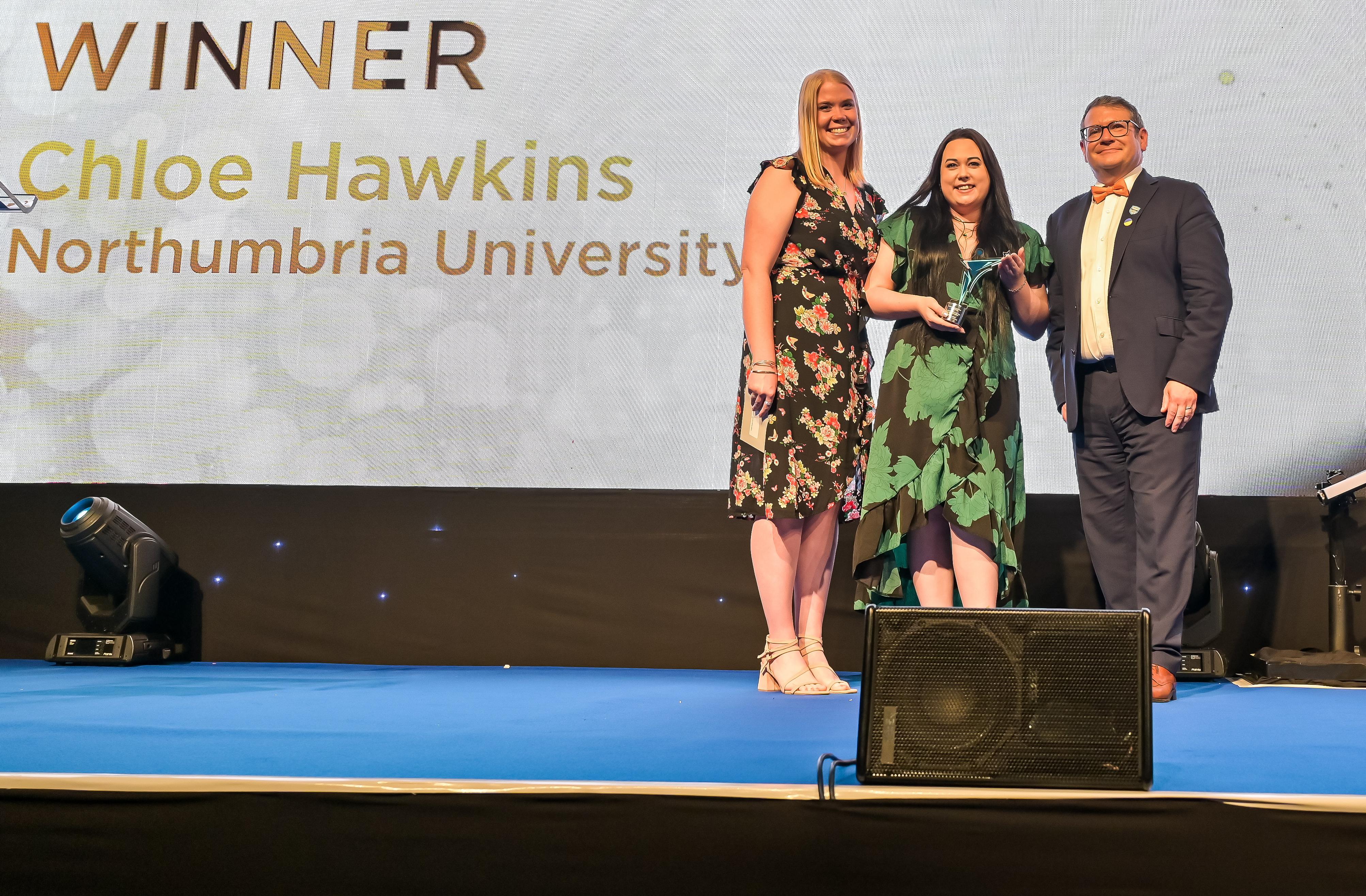
Chloe, from Hexham, has worked on placements in a range of wards in Northumberland and services at Cumbria, Northumberland, Tyne and Wear NHS Foundation Trust (CNTW) throughout her degree, which she began after working as a team manager in a supported living service. Handing out the award, the judges from Student Nursing
Times said that Chloe was an “exceptional role model, with a calming aura and positive, professional approach in nursing.”
Chloe was then delighted to hear that she had been invited to attend the King’s Coronation Concert by the Lord Lieutenant’s Office in recognition of her achievements. “I’m so proud to be able to represent learning disability nursing, and the North East,” said Chloe. “I wasn’t expecting to win, as this is such a prestigious award – it is such an honour. And to then find I had been invited to
the King’s Coronation Concert was truly amazing. I’m very grateful to all the patients and professionals I have worked with for sharing their experiences and allowing me to be a part of their journey. And the learning disability nursing lecturing team, who have always gone above and beyond to support students. I can’t wait to qualify and begin my work as a registered nurse!”
Dr Angela Ridley, the Head of Subject (Nursing) at Northumbria nominated Chloe for the award. “Chloe has always gone the extra mile,” she said. “She works tirelessly
as a champion and advocate for people with learning disabilities. Winning the award is a huge achievement, and recognises Chloe’s hard work, dedication and passion. She is an excellent ambassador for Northumbria University, and for people with learning disabilities.”
Outside of her studies, Chloe is an ambassador for learning disability nursing in the Future NHS Network, an online community for health and social care staff, and a chair of Future Learning Disability Nurses, an informal group for learning disability nursing students to network and support one another.
Northumbria University was also shortlisted in three other categories of the Student
Nursing Times Awards, with lecturers Barry Hill and Barbara Davies both in the running for the Best Student Experience title. The University’s work on a creative health awareness training programme with the Lawnmowers Theatre Company was also shortlisted for Partnership of the Year. Northumbria University offers a variety of speciality nursing programmes and is currently ranked number one in the UK for children’s nursing according to The Guardian.
Click the QR code to find out more about Northumbria’s learning disability nursing degree.

4 NEWS Northumbria University NEWS • Summer 2023
A talented nursing student from Northumbria University who “has always gone the extra mile” has been named the Learning Disabilities Student Nurse of the Year.
“I’M VERY GRATEFUL TO ALL THE PATIENTS AND PROFESSIONALS I HAVE WORKED WITH FOR SHARING THEIR EXPERIENCES AND ALLOWING ME TO BE A PART OF THEIR JOURNEY.”
CHLOE HAWKINS
Below: Pictured L-R: Jessica Ball (Learning Disability Acute Liaison Nurse at Sussex Community NHS Foundation Trust), Chloe Hawkins, Steve Ford (Editor, Nursing Times)
Funding boost for solar scientists
Scientists from Northumbria University’s worldleading Solar and Space Physics research group have been awarded more than £1 million to carry out research which will enhance our understanding of the Sun, and its impact on Earth.
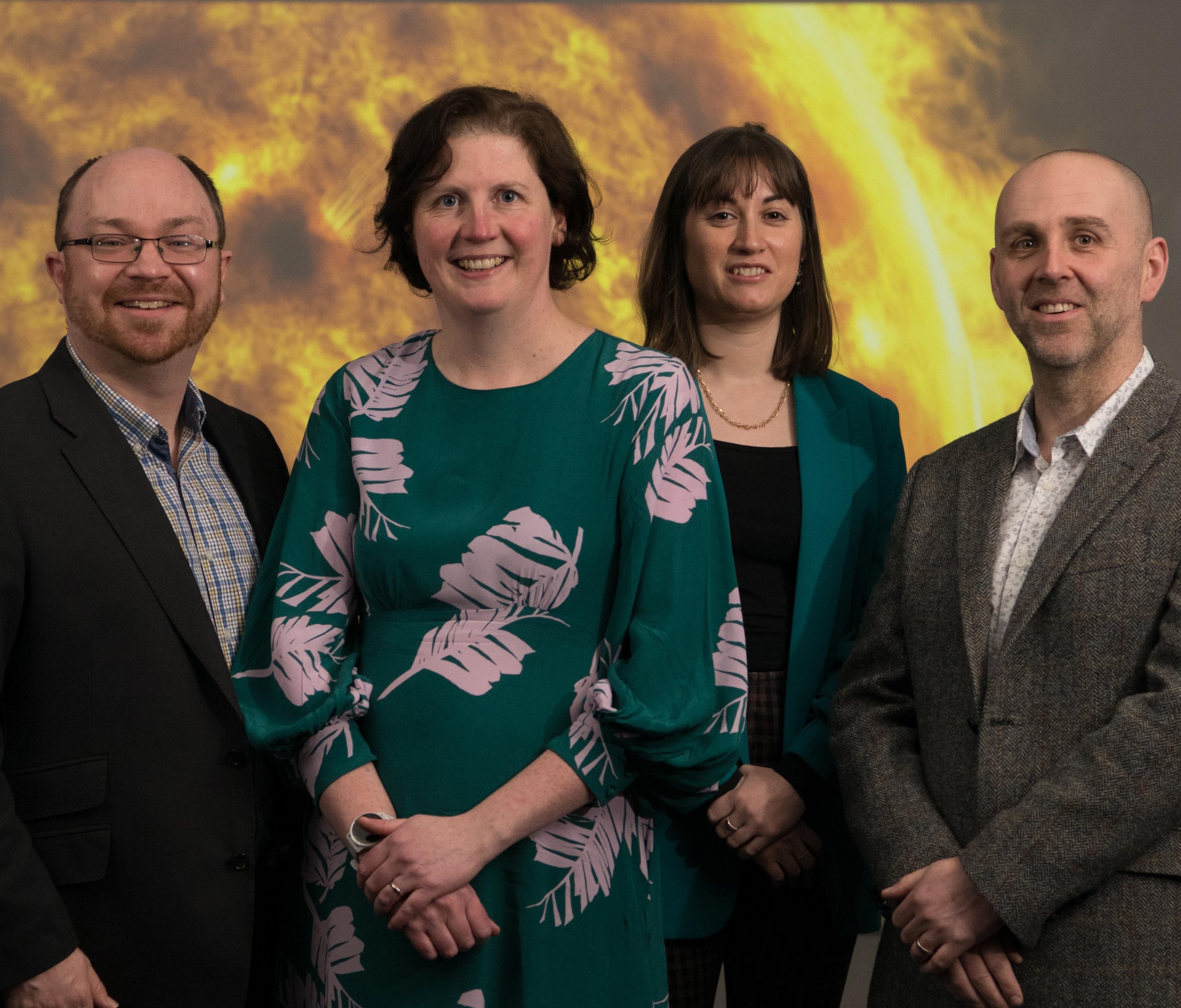
Researchers have received a £1.29m consolidated grant from the UK government’s Science and Technology Facilities Council (STFC) to fund four research projects, each exploring a different element of the Sun’s activity. They include the movement of particles from solar flares, the speed and movement of solar winds, the processes that heat the Sun’s outer atmosphere, and the dynamics of the radiation belts surrounding Earth.
Professor James McLaughlin heads up Northumbria University’s Solar and Space Physics research group and is lead investigator for one of the four projects. His research will focus on the process known as magnetic reconnection –when magnetic lines within the outermost part of the Sun’s atmosphere, the solar corona, become twisted, break apart, then reconnect. This results in a sudden release of electromagnetic energy in the form of a solar flare and a coronal mass ejection – an explosive acceleration of plasma away from the Sun towards Earth.
Professor McLaughlin and his colleagues will use high performance computing to run numerical simulations –using existing data gathered from past solar flares to better understand the reconnection process. Speaking about the research, he said: “When magnetic lines become twisted, they can store energy like an elastic band. If the lines break
and reconnect that energy is released. This is a very common occurrence in the solar corona and also happens in the atmospheres of other magnetically-active stars. When reconnection occurs that stored energy is transformed into other forms of energy –this could be a solar flare or coronal mass ejection, which in turn results in space weather which we experience on earth in the form of solar radiation or geomagnetic storms. One of the focusses of our research group is predicting space weather. To do that we need to understand its origins, and discovering more about what triggers solar flares will allow us to do that.”
Another of the projects funded through the STFC grant will explore the way in which high energy particles, such as
electrons, are distributed when released from a solar flare. Led by Dr Natasha Jeffrey, a ViceChancellor’s Research Fellow in Solar Physics, the project aims to reveal more about the conditions under which solar flares occur. Up until now it has not been possible to measure the angle that particles are distributed when released from a solar flare. However, because electrons release X-rays as they travel, scientists are now able to use data from the Spectrometer Telescope for Imaging X-rays (STIX), situated on board the European Space Agency’s Solar Orbiter satellite, to determine this information. And with the Sun currently entering its solar maximum – the period of greatest activity during its 11year solar cycle – there will be a
higher number of flares to observe, making this the optimum time for such research.
Speaking about the project, Dr Jeffrey said: “Up until now the directivity of the particles has been a missing diagnostic in our understanding of the acceleration environment of solar flares, but thanks to the data we can now obtain from STIX we can use state-ofthe-art electron and X-ray computer modelling and simulations to recreate the conditions under which the flare occurred.”
A further two projects have also received funding through the STFC grant. Professor of
Space Physics Jonathan Rae will use machine learning and artificial intelligence to better understand radiation belt electrons. Meanwhile, Professor of Space Physics Clare Watt will investigate the electromagnetic waves responsible for the loss of electrons into the atmosphere.
Click the QR code to find out more about Solar and Space Physics research at Northumbria University.

5 NEWS #TakeOnTomorrow
L-R: PROFESSOR JAMES MCLAUGHLIN, PROFESSOR CLARE WATT, DR NATASHA JEFFREY, AND PROFESSOR JONATHAN RAE
Uncovering the truth about Northern Ireland’s past
A Northumbria University linguist has been appointed to a panel which will advise a future public inquiry into historical institutional abuse of women and girls through Northern Ireland’s ‘mother and baby homes.’
Dr Patricia Canning, a researcher in forensic stylistics, linguistics, and discourse analysis, will form part of the 10-person independent Truth Recovery Programme Panel. Following years of relentless campaigning by victims and survivors for truth and accountability, the Northern Ireland (NI) Executive commissioned a team to consider evidence and research the operation of Mother and Baby Institutions across Northern Ireland.

Throughout the mid-1900s, mother and baby homes emerged across Northern Ireland and Ireland to provide refuge for unmarried mothers and their babies who were left without adequate support or
family. Predominantly operated through church orders and funded by the Irish government, these institutions aimed to support women in a patriarchal environment. Women admitted to the homes ranged from 12 to 40 years old, with 80% between the age of 18 and 29. Many mothers admitted fell pregnant out of wedlock and these homes acted as an early form of shelter for neglected women and orphanages for vulnerable children - later developing into adoption agencies.
Research into these mother and baby homes, conducted by Queen’s University Belfast and Ulster University in 2021, revealed some of the horrendous experiences of the women and girls and their children
who were admitted to the institutions up to the late 1990s. Despite the revelatory nature of this research, it also left many questions unanswered and as a result, the NI Executive agreed to form a panel of experts across a variety of disciplines to investigate these institutions further. The Police Service of Northern Ireland (PSNI) also launched a major investigation into the institutions and have received more than 80 reports of historic alleged crimes at mother and baby homes across the country. Many of the women felt coerced into giving up their children and the PSNI said reports included some from mothers who have never met their children.
Dr Canning is an applied
linguist specialising in forensic texts and contexts. Her work includes the investigation and analysis of police reporting, particularly the attribution and deflection of blame through individual and institutional language choices. “I’m honoured to be taking up this important role and am privileged to be working with such a diverse and experienced team,” said Dr Canning. “Our work will develop the excellent research conducted by scholars at Ulster University and Queen’s University, Belfast and we will complete our work within 24 months with a key focus on primary research via oral testimonies before presenting our findings. I am completely committed to the panel’s remit,
and to ensuring that those most affected by institutional injustices remain central to the work that we do.”
The Linguistics group at Northumbria University is one of the strongest centres for research in cognitive linguistics not just in the UK, but internationally. The Centre hosts the journal Cognitive Linguistics, the flagship journal in the field, and has an established reputation for research into language learning and teaching.

Click the QR code to find out more about linguistics research at Northumbria.

6 NEWS Northumbria University NEWS • Summer 2023
Left: Dr Patricia Canning
“I AM COMPLETELY COMMITTED TO THE PANEL’S REMIT, AND TO ENSURING THAT THOSE MOST AFFECTED BY INSTITUTIONAL INJUSTICES REMAIN CENTRAL TO THE WORK THAT WE DO.”
DR PATRICIA CANNING
Unveiling Jupiter’s upper atmosphere
A North East planetary astronomer has been granted rare access to the world’s largest deep-space telescope, providing him with a unique opportunity to discover more about the largest planet in our solar system – Jupiter.

Launched in December 2021, NASA’s James Webb Space Telescope (JWST) uses infrared radiation to look deep into space, meaning it can observe the first stars and even the formation of the first galaxies. Following an international callout Professor Tom Stallard, of Northumbria University, has been awarded a highly sought after opportunity to use the JWST later this year, allowing him to further his research into Jupiter’s atmosphere.
This is only the second year scientists have been given the chance to request access to the telescope, and with fierce competition from across the world, Professor Stallard’s observation is the only one chosen this year which will focus on a planet within our solar system. He and his coinvestigator Dr Henrik Melin, of the University of Leicester, will use their time to examine Jupiter’s ionosphere – the planet’s upper atmosphere –
and how it is impacted by the space environment above it, and Jupiter’s lower atmosphere below.
As Professor Stallard explains: “The ionosphere is a very interesting layer because it is buffeted by massive systems surrounding it – with energy pushed up from below and solar winds and volcanic activity from Jupiter’s moons affecting it from above. Although Jupiter appears very different to Earth there is actually much we can learn about our own planet by studying Jupiter. The processes going on are very similar, but Jupiter’s magnetic field is much stronger, and stranger.
Time on the James Webb Space Telescope is rare – and time to study planets within our solar system is even rarer, so to be given this opportunity is incredibly exciting.”
Professor Stallard’s access to the JWST will take place on 7 September and has been timed perfectly to coincide with the
positioning of the Juno NASA space probe, which orbits Jupiter. This means he will be able to compare the images taken from the JWST, which is positioned between the Earth and the Sun looking towards Jupiter, with measurements from Juno, positioned behind Jupiter and looking back at Earth.
Professor Stallard added: “The images we are going to get from the James Webb Space Telescope will be profoundly wonderful, I’m sure. We’ve already had a taster of what to expect following an early observation by my colleague Dr Melin, which suggests there is science going on within Jupiter’s atmosphere which we simply don’t have any understanding about yet, and there is a lot of excitement within the community of scientists studying upper atmospheres about what the images we get from the telescope will tell us.”
“TIME ON THE JAMES WEBB SPACE TELESCOPE IS RARE – AND TIME TO STUDY PLANETS WITHIN OUR SOLAR SYSTEM IS EVEN RARER, SO TO BE GIVEN THIS OPPORTUNITY IS INCREDIBLY EXCITING.”
Commenting on Professor Stallard’s success, Professor Louise Bracken, Pro ViceChancellor (Research and Knowledge Exchange) at Northumbria University
commented: “Securing access to the James Webb Space Telescope is a highly competitive process and is a testament to the quality and timeliness of the research that Professor Stallard undertakes. This award underlines and builds on the existing work of our Solar and Space Physics
researchers at Northumbria University and cements the North East’s reputation as a centre of excellence in this field.”
Solar and Space Physics is a peak of research excellence at Northumbria University. Click the QR code to find out more about the work of academics carrying out research in this field.

7 NEWS #TakeOnTomorrow
PROFESSOR TOM STALLARD
PROFESSOR TOM STALLARD
Prestigious award recognises inspirational teaching
Northumbria academic Dr Rachael Chapman has been awarded the inaugural Vicky Randall Prize by the Political Studies Association (PSA) in honour of her outstanding contribution to advancing teaching and learning in Political Studies.
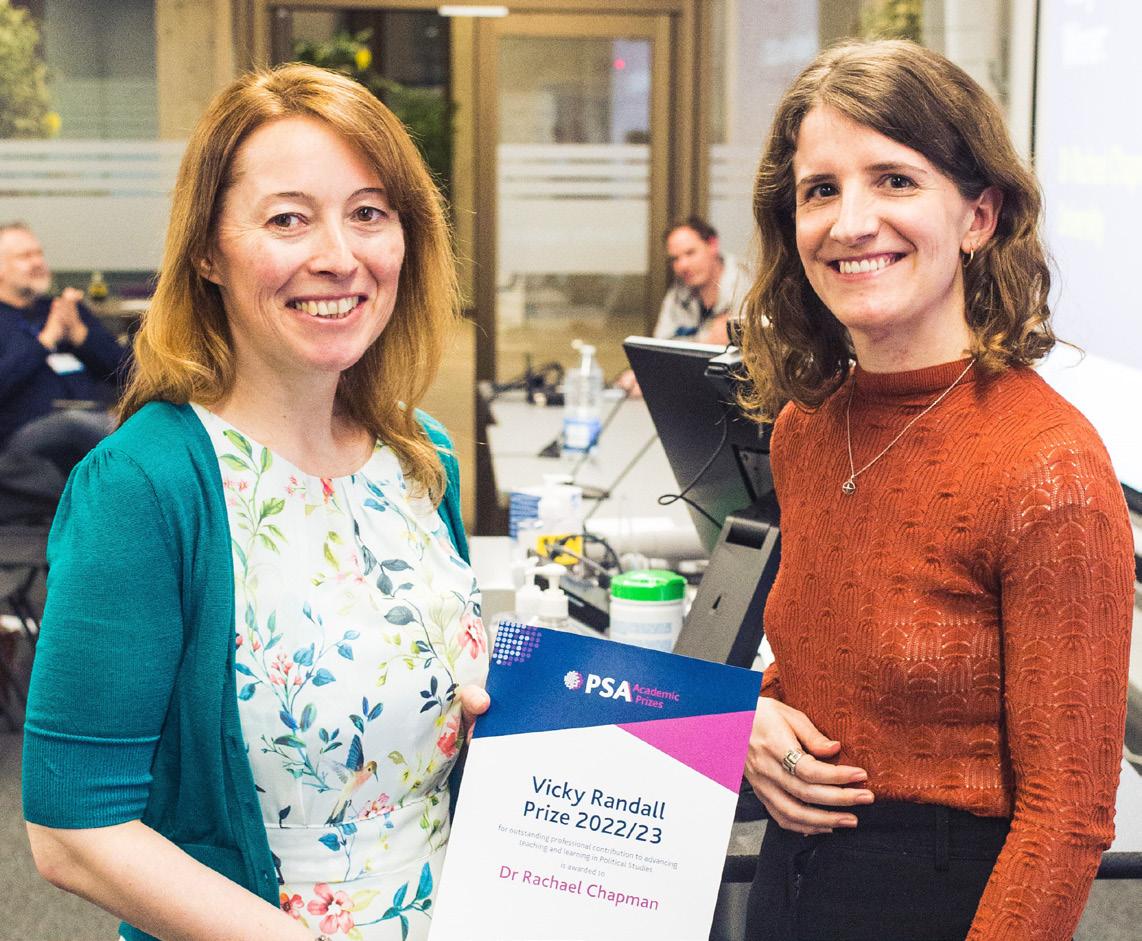
National Fellowship for youth justice expert
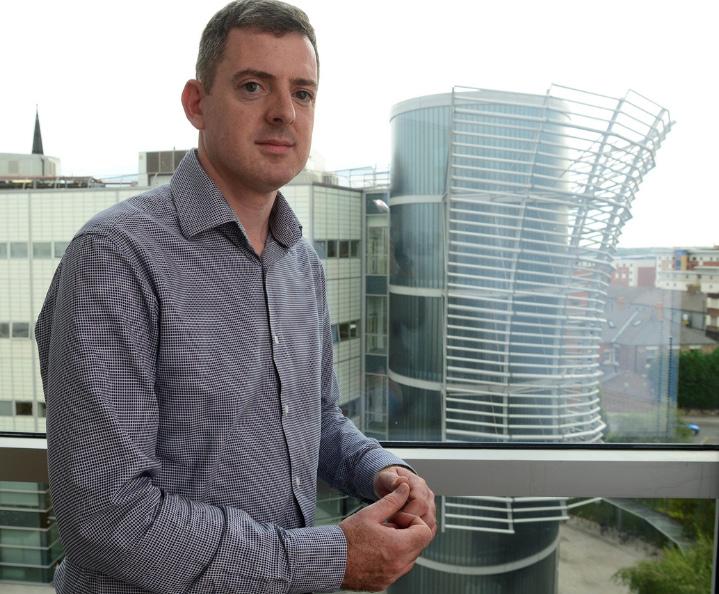
“THE ACADEMY PLAYS A VITAL ROLE IN CHAMPIONING OUR DISCIPLINE AND DEEPENING UNDERSTANDING OF HOW SOCIAL SCIENCES CAN HELP SHAPE CONTEMPORARY SOCIETIES.”
An Associate Professor in the Department of Social Sciences, Dr Chapman teaches International Relations and Politics and won praise from the judges for her commitment to developing a lasting partnership with Urban Green Newcastle to ensure her students gain real-world knowledge and experience during their studies.
Urban Green Newcastle is an independent charity that collaborates with the people of Newcastle upon Tyne, local businesses, and partners to create safe, welcoming and well-maintained parks and allotments that benefit all communities across the city. Dr Chapman now regularly works with the charity involving students in live projects which engage the community in the co-design and management of local parks.
The PSA exists to promote and develop the study and teaching of politics. Academic prizes are presented every year during the PSA annual conference with the new teaching prize named in
memory of the late Professor Vicky Randall, a former chair of the PSA.
Chief Executive of the PSA, Michelle Doyle Wildman, said: “The late Professor Vicky Randall was chair of the PSA from 2008 to 2011 and was widely admired as a pioneer in gender research who also gave generously of her time and wisdom to mentor emerging scholars. Rachael clearly continues Vicky’s legacy and is a very worthy winner of this prize.”
Dr Chapman has also recently been awarded a research grant in the form of a prestigious British Academy Innovation Fellowship which will feature, as a case study, the model of greenspace management implemented in Newcastle by Urban Green. Click the QR code to discover more about Dr Chapman’s teaching, future research and watch a video about the collaboration with Urban Green Newcastle.
The National Academy of Social Sciences, which champions the role social science plays in education, government and business, has an Academy Fellowship of up to 1,500 leading social scientists from academia, the public, private and third sectors whose research or practice addresses major challenges facing communities, society, places and economies. All Fellows are conferred following independent and robust peer review by the Academy’s Nominations Committee. Professor Arthur has published a number of journal articles on the delivery of justice for children and families, the complex linkage between parenting and youth offending, and the extent to which the youth justice system in England and Wales protects children’s human rights. He joins 56 other leading social
scientists who have been conferred by the Academy this spring – all highly accomplished individuals recognised for excellence in their fields and wider contributions to the social sciences for public benefit.
Commenting on his Fellowship, Professor Arthur said he was delighted and honoured, adding: “The Academy plays a vital role in championing our discipline and deepening understanding of how social sciences can help shape contemporary societies. In my own area of research, youth justice, reducing reoffending and child welfare are hugely important issues, so it is rewarding to see this recognised through an Academy Fellowship.”
Professor Robert MacIntosh, Pro Vice-Chancellor for the Faculty of Business and Law at Northumbria, added:
“Receiving a Fellowship from the Academy of Social Sciences is a highly competitive process and an impressive personal accolade for Professor Arthur. With the standards set so high it also reflects extremely positively on the Law School, the faculty and the wider university.”
Will Hutton, President, Academy of Social Sciences said: “The Academy of Social Sciences is delighted to welcome an excellent range of highly distinguished social scientists from Scotland, Wales, Northern Ireland, England, and beyond. As the work of social science becomes ever more important, we look forward to engaging with them in 2023.”
Click the QR code to read more about Northumbria Law School.


8 NEWS Northumbria University NEWS • Summer 2023
Professor Raymond Arthur, from Northumbria Law School, has been awarded a Fellowship of the National Academy of Social Sciences in recognition of excellence in his field and contributions to youth justice.
PROFESSOR RAYMOND ARTHUR
L-R: DR RACHAEL CHAPMAN WAS PRESENTED WITH THE VICKY RANDALL PRIZE BY PROFESSOR RANDALL’S DAUGHTER, LOUISA LONG
Engineering success with major scholarship programme
Nanojet research breakthrough
A mystery which has baffled astronomers and physicists for decades is a step closer to being solved thanks to a partnership between Northumbria University and leading US aerospace technology organisation, Lockheed Martin.
The Solar Corona is the outermost part of the Sun’s atmosphere, and yet it reaches temperatures millions of degrees hotter than the surface of the Sun. One theory to explain this high temperature is through a process known as magnetic reconnection. This is where magnetic field lines within the corona break and reconnect, resulting in a sudden burst of heat-generating energy.
In 2021 a team of researchers, led by Northumbria’s Dr Patrick Antolin, found direct evidence that this reconnection produces a ‘nanojet’ – heated plasma travelling sideways very fast between magnetic field lines. The size and speed of nanojets make them difficult to detect and predict, with existing footage of the process in action captured purely by chance. In a bid to gather more evidence, Northumbria PhD student Ramada Sukarmadji, under the supervision of Dr Antolin, is working with scientists from Lockheed Martin to develop algorithms which will automatically record nanojets when they occur.
The team will analyse existing footage of nanojets captured by NASA’s Interface Region Imaging Spectrograph (IRIS) and Solar Dynamics Observatory (SDO) telescopes, which Lockheed Martin helped design and build. They
will then identify the unique features of nanojets and create algorithms using machine learning – an AI technique that teaches computers to learn from experience. This will allow scientists to automatically detect nanojets, ensuring they are captured for analysis.

Ramada recently spent five weeks working alongside scientists at the Lockheed Martin Solar and Astrophysics Laboratory in Palo Alto, California. Funding for the trip was secured through the European Space Agency, as well as the Turing Scheme, a UK government programme which provides opportunities for students from schools, colleges, and universities to work or study abroad.
Speaking about the research project, Ramada said: “By analysing data from previous occurrences of nanojets we can essentially ‘teach’ a computer to identify nanojets through machine learning. This will allow us to capture future events and really develop our understanding of this phenomena and how it contributes to the heating of the Corona.”
Click the QR code to find out more about solar and space research at Northumbria.
Leading UK aerospace and technology companies Cobham and Ultra Electronics have announced a scholarship funding partnership with Northumbria University worth £500,000.

The Cobham & Ultra Scholarship Programme is aimed specifically at supporting Northumbria students from underrepresented groups looking to study engineering degrees. This announcement forms a wider pledge totalling £5 million which has been distributed to a number of universities that are recognised both in the UK and globally as leaders in engineering research and teaching. Over 100 students across these universities who are starting their studies in September 2023 will receive funding for each remaining year of their undergraduate degree. The programme will seek to support more than 500 students over the next several years.
Cobham and Ultra Electronics have worked with the universities, including Northumbria, to guarantee the scholarship conditions ensure students most in need of financial support are selected – an approach that aligns closely with Northumbria’s commitment to social mobility and unlocking potential for all.
Northumbria students who secure the scholarships will be
offered a number of additional benefits including first-hand mentoring and guidance from experienced engineers, as well as work experience opportunities including potentially up to a year in industry.
Engineering degrees are closely linked to both businesses, with Cobham and Ultra Electronics currently employing over 600 graduate engineers in the UK alone. Shonnel Malani, Chairman of the Board of Cobham and Ultra Electronics said: “Ultra Electronics and Cobham’s history are steeped in engineering success, we
therefore recognise investment in engineering skills and education is key for unlocking future growth, boosting productivity and helping to build the skilled workforce of the future in the UK.”
Professor John Woodward, Pro Vice-Chancellor for Engineering and Environment, Northumbria University, added: “Unlocking potential is a driving force at Northumbria, with up to 40% of our undergraduates coming from under-represented communities. We aim to attract and retain the most talented students, irrespective of background, which is why this scholarship is so important and welcomed - and why we are delighted that Cobham and Ultra Electronics have chosen to support these students with this generous scholarship scheme.”
Click the QR code to read more about donating to Northumbria’s scholarship programmes.


9 NEWS #TakeOnTomorrow
NORTHUMBRIA PHD STUDENT RAMADA SUKARMADJI
The Conversation is a collaboration between news editors and academics to provide informed news analysis and commentary that’s free to read and republish. At Northumbria, our academics have been working with The Conversation to produce independent, quality current affairs journalism on some of the latest topics to hit the news.
HERE ARE SOME OF OUR TOP PICKS OF RECENTLY PUBLISHED ARTICLES
CALLING ALL NORTHUMBRIA ACADEMICS!
If you have a great idea for an article, please email media.communications@northumbria.ac.uk






Bonobos and chimps: what our closest relatives tell us about humans
Researchers have historically turned to chimpanzees for insight into our natural behaviours, but now all eyes are on the gentler bonobo. Assistant Professor, Dr Jose Yong from Northumbria’s Department of Psychology, discusses social traits of the great apes and what they might be able to tell us about ourselves.





How running can help you cope with stress at work
With research suggesting that one in seven of us experience mental health problems associated with work, Professor Kate Black and Dr Russell Warhurst from Northumbria’s Newcastle Business School, discuss how picking up running could be just as good training for your mind as it is for your body.
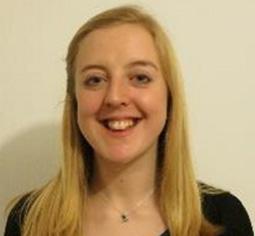
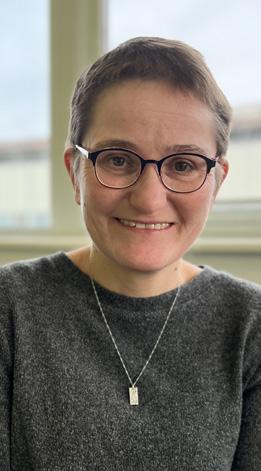

Hundreds of rivers and lakes cross international borders – countries need to commit to sharing the water


Multinational rivers play an important role in the function of many countries however droughts, climate change and pollution risk leaving those downstream stuck in the mud. Professor Alistair Rieu-Clarke from Northumbria Law School discusses the need for cooperative action to make sure everyone gets a fair deal.
La Niña is finishing an extremely unusual three-year cycle – here’s how it affected weather around the world
Assistant Professor, Dr William Roberts and Research Fellow, Jayasankar Pillai from Northumbria’s Department of Geography and Environmental Sciences discuss El Niño and La Niña events and how the Pacific-wide atmospheric phenomenon has a wider impact on the entire planet.

Tropical seagrass meadows are sand factories that can help defend coral reef islands from sea-level rise

Seagrass meadows provide refuge and food for various sea life, but recent research suggests they may have a role building and maintaining islands. Assistant Professor Dr Holly East and Research Assistant Jamie Johnson, from Northumbria’s Department of Geography and Environmental Sciences, explain how such a simple plant is shaping the Maldives.
Why sleep is so important for your fitness

When we think of what makes athletes great, few of us might immediately think of sleep schedules. However, Dr Ian Walshe, Assistant Professor in Northumbria’s Department of Sport, Exercise and Rehabilitation, highlights the impact that poor sleep quality can have on your health, fitness and sporting performance.
Find out more about The Conversation, and keep up to date with articles by Northumbria academics, by visiting www.theconversation.com or our online newsroom at www.northumbria.ac.uk/news

10 Northumbria University NEWS • Summer 2023
functions. They aren’t expecting to be passed from team to team to get the right answer to their enquiry, so we’re working hard to streamline this experience as much as possible.
As part of this we’re constantly looking at the insights that we’re gathering about students through the digital footprints they leave when using our systems and services every day.
THE BIG INTERVIEW
MAUREEN MCLAUGHLIN
Northumbria University News asks Academic Registrar and Director of Student, Library and Academic Services, Maureen McLaughlin how Northumbria supports all students with university life irrespective of background or circumstances, and what the future of student support looks like.

Tell
I’m originally from the North East, and I always thought I’d come home eventually – although it took me nearly 40 years to do so! My first HE job, in 1990, was at a further education college, and from there I went on to work in a local Polytechnic in Manchester. I’ve worked in all kinds of different universities, from traditional large ones to smaller more modern institutions. I even had a stint working overseas working for the University of the South Pacific – which you can imagine I think of each and every rainy day!
I also spent a decade working for the Quality Assurance Agency for Higher Education, and Northumbria was one of the institutions that I engaged with regularly in that role.
Northumbria has always been seen as a beacon for good practice and a touch point for really positive professional administration. If you were looking for good practice in terms
of professional administration, student services or even what a good training exercise looks like, in my opinion this University has always been seen as the one to emulate.
So, when the opportunity came up to work here and come back home it really was an easy decision.
Building on that ‘beacon for good practice’, what can students expect from the support experience at Northumbria?
Since arriving at Northumbria my eyes have been opened to the professionalism of all colleagues here, they really do everything in their power to put an excellent student experience at the heart of everything we do.
We welcome students through a strong induction programme designed to help them settle in and get to grips with university life – this activity goes well beyond Welcome Week at the start of the academic year; including things like regular study skills, how to manage money and wellbeing sessions to name just
a few. The team will also reach out regularly to students to see how they are getting on, and if they need a bit of extra help with things inside or outside the classroom.
When you layer on the help we offer through Graduate Futures (our careers team), Academic Support, Student Life and Wellbeing, Learning Skills from the University Library, we feel that we provide strong, holistic wraparound support that all our students may need at some point during their university journey.
What does the future of our students’ support experience look like?
As somebody who has worked in this field many years the main thing is not just to keep pace with current student thinking, but wherever possible to stay ahead of it too.
We’re using this information intelligently and sensitively, with their consent of course, to build the kind of support mechanisms that students need. As part of this, the information is also helping us to develop systems that will flag where our teams can step in to help at a very early stage, so that we can guide students into the right support at the right time. And while we can use technology to our advantage, there will always be a need to deliver the human touch and that’s something we really are conscious of – our people will always be there to help. Students will always be able to talk with a reliable, caring person at Northumbria, whether that’s through our academic or professional teams, or our fantastic Students’ Union.
Continuing to offer an inclusive and supportive environment is also key. Northumbria has historically been a popular choice with students from all walks of life, with 40 per cent of our UK undergraduates coming from areas that don’t typically have large numbers of people going into Higher Education – our support environment that we have created has been very important in this growth.
In addition, we’re also continuing to see growing numbers of people from around the world choosing to come and study here which is exciting, but we need to be sure we’re offering what all students need, regardless of their background or nationality. This is especially important if we want them to stay in the region, indeed, 63 per cent of our graduates stay in the region for employment, and we would love it to be even more.
How can our support help to unlock potential for all students?
We want to help students to have the ability to transform, both themselves and the world around them, regardless of their own circumstances or background when they enrol with us.
For example, we have our fantastic NU Belong scheme, with a team specifically focussed on regularly talking with students from a variety of backgrounds, to help build an inclusive learning environment. Students who qualify for this extra support are typically
those who are carers, care leavers, estranged from families, or are Sanctuary (refugee) scholars. It’s up to us to make them feel supported, included, and above all part of something much bigger – part of a community. As part of this we give students the opportunity to hear from people with similar backgrounds to themselves, including Students’ Union members or even academic or support service colleagues, about how Northumbria and Higher Education made a real difference to them and their lives.
How does Northumbria support students to start thinking about their future beyond graduation?
Our graduate outcomes are stellar - we’re ranked in the Top 30 in the UK for graduates going into highly skilled employment after they leave university.
Preparing for future success really starts as soon as students arrive on campus. Our fantastic Graduate Futures team are talking to students about their options from the first day of Welcome Week, as so much good work can be done early to help activate a students’ career readiness mindset. And if students don’t know what they want to do on day one, then that’s ok too! The team are here to help with ambitions and future hopes, which for many students may not have even really started to generate. We help them with activities like placements for internships, further study or volunteering which will help with CV building and could inform and shape their future career choices too.
Finally, what would you say to someone who is thinking of studying at Northumbria?
We really do put the student at the heart of everything we do to make sure we are able to unlock their potential no matter their background or circumstances. So, if you are thinking about coming to Northumbria, please do get in touch with us and come and talk to us. Visit our website and come and talk to us at an open day.
Click the QR code to discover more about the range of support services available to Northumbria students.

11 #TakeOnTomorrow FEATURE
Like most people now, students are used to technology delivering the exact information and guidance they need at any given time and it is completely integrated and connected across various support us a bit about your background and what brought you to Northumbria.
Can a podcast influence research culture?
A popular podcast which shares regular insights into the trailblazing research and teaching at Northumbria University’s School of Design has become the subject of a study aimed at uncovering the potential impact on research culture.
Led by Senior Research Assistants Helen Simmons and Dr Nkumbu Mutambo, the Designamite podcast was launched last summer as a way of helping to share news with a global audience from the people and projects driving creativity and innovation across all activities within the School of Design.

Each episode features guests from a range of disciplines who are invited to discuss their areas of expertise, collaborations and upcoming events to showcase some of the exciting ways staff and students are helping to influence change for the better through their work.
Early episodes focused on the priorities of the Creative Fuse North East team, a partnership involving all five of the North East’s universities and funded by the Arts and Humanities Research Council (AHRC) and the European Regional Development Fund (ERDF), to support growth and innovation in the creative,
cultural, IT and digital sectors across the region.
Since then, Helen and Nkumbu have used podcasting booths and roving mic to record Designamite episodes, including at the Design Council’s Design for Planet Festival, held in partnership with Northumbria last year.


A special eight-part series of episodes on the theme of Fashion Cultures has also been recorded, covering everything from ‘slow fashion’ and cosplay to the use of wool fibres in commercial fashion.
“The audience is growing all the time and now includes listeners from across the UK, Czech Republic, Germany, Spain, Peru, Brazil, Malaysia and Canada,” said Helen. “There’s a great community forming from our initial idea of starting Designamite as an alternative way of sharing information. We felt it was important to recognise all the ways research can be captured and shared.”
“THERE’S A GREAT COMMUNITY FORMING FROM OUR INITIAL IDEA OF STARTING DESIGNAMITE AS AN ALTERNATIVE WAY OF SHARING INFORMATION. WE FELT IT WAS IMPORTANT TO RECOGNISE ALL THE WAYS RESEARCH CAN BE CAPTURED AND SHARED.”
Now, with the support of Knowledge Exchange and Research Impact Pump Priming funding awarded by the University, Designamite has become the focus of a six-month research study which aims to investigate whether the podcast is benefitting the research environment within the School of Design.
“We want to try and document how the podcast has been used during this time and find out whether colleagues feel it has had an impact on inspiring new ideas, raising awareness of each other’s work, and further improving the collaborative research culture we already have,” explained Nkumbu.
Helen added: “It’s definitely given me a renewed sense of
HELEN SIMMONS
community and we want to see if that has been felt more widely by speaking to podcast listeners and contributors before and after the Fashion Cultures episodes have been released. Because the podcast is so accessible, we’re finding more and more now that our guests are approaching us to be part of it.”
Helen and Nkumbu, who both had limited knowledge of podcasting before Designamite was launched, hope through the research study they will be able to use the qualitative data collected to measure the reach and impact of the podcast.
Current Northumbria Master’s student, Elnaz Honarmand Tamizkar, has also joined
the Designamite team as an intern to help grow the podcast audience further with the help of social media.
Dr Heather Robson, Head of Northumbria’s School of Design, said: “I firmly believe in the power of design to make a positive and significant impact on the world; the work and research of colleagues that takes place in the School is inspirational. Through the Designamite series, Helen and Nkumbu are capturing that and offering a meaningful insight and real sense of our community.”
Click the QR code to listen to episodes of the Designamite podcast on Spotify.

12 NEWS Northumbria University NEWS • Summer 2023
DR NKUMBU MUTAMBO (LEFT) AND HELEN SIMMONS (RIGHT) JOIN DEPUTY HEAD OF NORTHUMBRIA SCHOOL OF DESIGN, DR ROD ADAMS, FOR A DESIGNAMITE PODCAST EPISODE
Above:
Senior Research Assistants from Northumbria School of Design, Helen Simmons and Dr Nkumbu Mutambo
Creative opportunities for local teenagers
Teenagers from across the North East are being given the chance to take part in art and design activities at Northumbria University as part of the National Saturday Club programme.

The National Saturday Club operates across the country with support from a network of universities and colleges to offer young people aged 13 to 16 a unique opportunity to explore subjects they love for free, to build new skills, meet new people, and to explore future study and career possibilities.
Weekly Saturday classes were launched by staff at Northumbria’s School of Design and Department of Arts in the autumn of 2022 and have proved so popular that there’s already a waiting list to join the sessions.



Dr Rod Adams, Deputy Head of Design at Northumbria, said: “We’re currently working with around 26 young people who are being given the chance to experience a cross section of the art and design subjects Northumbria has to offer – from fashion and fine art to graphic and interior design. We’re the most northern Saturday Club in the country, with the nearest ones held in Middlesbrough, so we hope we’re helping to spread opportunity while demonstrating some of the career paths available in the creative and cultural industries.”
Northumbria Fine Art graduate, Sophie Crocker, has been employed to lead the Club along with nine student assistants who are currently studying relevant subjects at the University at undergraduate and postgraduate level.
They are all supported by experts in their fields to devise and deliver each of the Saturday classes.
As part of every 20-week Club schedule, young people will participate in National Saturday Club events including masterclasses with leading industry professionals, a summer show where Saturday Clubs nationwide exhibit their work in a public exhibition, and a graduation ceremony for Club members to celebrate their achievements. The National Saturday Club has a particular focus on engaging young people from disadvantaged backgrounds and underrepresented communities, who would not otherwise have these
“ THE PARTICULAR FOCUS WITHIN THE NATIONAL SATURDAY CLUB MODEL ON ENGAGING YOUNG PEOPLE FROM DISADVANTAGED BACKGROUNDS AND UNDERREPRESENTED COMMUNITIES, FITS WELL WITH OUR AMBITION AT NORTHUMBRIA TO GIVE ALL STUDENTS WITH POTENTIAL AND ABILITY THE OPPORTUNITIES TO SUCCEED.”
opportunities open to them within the world of art and design.
Professor Caron Gentry, Faculty Pro Vice-Chancellor for Arts, Design and Social Sciences at Northumbria University, said: “We’re extremely proud that Northumbria is now part of the remarkable network of National Saturday Clubs, which bring together higher education,
further education, the cultural sector and industry to deliver enriching extra-curricular activities for young people.
The particular focus within the National Saturday Club model on engaging young people from
disadvantaged backgrounds and underrepresented communities, fits well with our ambition at Northumbria to give all students with potential and ability the opportunities to succeed.”
Click the QR code to discover more about The National Saturday Club at Northumbria University.

13 NEWS #TakeOnTomorrow
Below: Kriss Kyle in action.
Images by Eilidh McKibbin
PROFESSOR CARON GENTRY
Young people from across the North East aged 13 to 16 are being given the chance to experience art and design activities at Northumbria
Alumnus among the most influential in theatre industry
A Northumbria University graduate, and founder of Newcastle’s Alphabetti Theatre, has been voted as one of the 100 most influential people within the UK theatre and performing arts industry over the last year.

Ali Pritchard graduated from Northumbria University’s Drama and Scriptwriting BA (Hons) programme in 2012 and went on to establish the fringe theatre company Alphabetti, of which he is artistic and executive director. He has now been named in a list of 100 rising stars of 2023 by The Stage newspaper and website.
Described by The Stage as ‘punching far above its weight’, the Alphabetti Theatre overhauled its programming last year to enable productions to run for longer – many for up to three weeks, allowing it to stepup its support for artists.
Alongside every full-length production run, Alphabetti Theatre also commission a local creative to make a response piece, providing additional opportunities within the regional theatre scene.
Speaking about the impact Northumbria has had on his career, Ali said: “My time at Northumbria University shaped my career path, the introductions and connections
the course opened up to me have been vital. I am still in regular contact with a number of my old lecturers; collaborating with them and fellow alumni.”
As well as supporting local creatives, Ali has also offered support to the wider Newcastle community by opening up the Alphabetti Theatre as a ‘warm space’, supported by crowdfunding and the Co-op Warm Spaces Funding Boost.

Between October and December last year the theatre was open from 11am to 11pm, Tuesday to Saturday, providing a warm, welcoming space at a time when the cost of energy was at an alltime high.
The theatre provided free internet access, as well as social and cultural activities such as a poetry library, arts and crafts, darts and colouring in, as well as recently expanding its activities to include free cookery classes, ‘pay what you feel’ haircuts and shaves, financial advice and other support for anyone who may be struggling during the cost-of-living crisis.
Commenting on Ali’s success, Steve Gilroy, Deputy Head of Arts at Northumbria University, said: “Whilst studying Drama and Scriptwriting with us at Northumbria it was clear that Ali had an infectious entrepreneurial spirit.
“Ali has kept a close relationship with the University in the years since graduation and in exchange for the support we have given him, he has given generously of his time, working with and inspiring current students.
“With his boundless energy and enthusiasm Ali, soon after graduation, set up his first venue above a pub and has gone on to establish Alphabetti Theatre and make a fantastic contribution to the cultural life of this City and region.”
Dr Patrick Duggan, head of Film, Media, Theatre and Performance at Northumbria, added: “Ali’s work with Alphabetti is absolutely phenomenal, and this accolade from The Stage is richly deserved.
“MY TIME AT NORTHUMBRIA UNIVERSITY SHAPED MY CAREER PATH, THE INTRODUCTIONS AND CONNECTIONS THE COURSE OPENED UP TO ME HAVE BEEN VITAL.”
ALI PRITCHARD
“Not only does the theatre create and commission performance works that are urgent and timely, it also serves an important civic and cultural role in the city and North East.
“We’re delighted for Ali, and for Alphabetti, and we look forward to continuing to
educate future generations of theatre and cultural industries leaders at Northumbria.”
Click the QR code to learn more about the Alphabetti Theatre.

14 NEWS Northumbria University NEWS • Summer 2023
Unearthing our ancestors’ past
A Northumbria University forensic scientist is part of a team which has unearthed the earliest example of burials by human ancestors.
Dr Patrick Randolph-Quinney, Associate Professor of Forensic Science at Northumbria, specialises in taphonomy and thanatology - the science of death and processes that affect a body from decomposition, through to skeletonisation. In a project funded by the National Geographic Society Dr Randolph-Quinney was one of a, team of experts who unearthed new evidence in the Rising Star cave system in South Africa suggesting an ancient human ancestor named ‘Homo Naledi’ buried their dead. This symbolic behaviour has been previously associated only with modern humans and Neanderthals.
Bodies of Homo Naledi adults and several children, thought to be younger than 13 were deposited in foetal positions within pits, which suggests intentional burial of the dead. With the remains having been dated to 226,000 to 335,000 years old, these findings could be some of the earliest examples of burial practices by a human ancestor, predating the earliest known Homo Sapiens’ burials by at least 100,000 years. This makes the Rising Star burials the most ancient in the world.
Fossils belonging to Homo Naledi were first discovered in the Rising Star cave system in South Africa during excavations in 2013. The cave system is part of South Africa’s Cradle of Humankind, a UNESCO World Heritage Site encompassing an area where scientists have found fossils of multiple ancient human species, unlocking new evidence about how our ancient human ancestors lived.
Dr Randolph-Quinney has worked extensively in funerary and mortuary archaeology, recovering human and animal remains from deep prehistory through to the recent past.
As a forensic scientist he has extensive casework experience in both forensic anthropology
and archaeology in the UK and sub-Saharan Africa, including recovery of bodies from homicides, fatal fires, and human rights abuses. He has used his experience from funerary archaeology and forensic casework, together with experimental studies of how human bodies decompose and methods of 3D imaging and spatial analysis, to help understand the site formation processes and burials of Homo Naledi within the Rising Star cave system.
“I have used a branch of forensic science called forensic taphonomy to understand the processes that affected the bodies of Homo Naledi after they died,” said Dr RandolphQuinney. “Forensic taphonomy uses data from experiments conducted at forensic research facilities – so-called body farms – where decomposition of humans and other animals can be studied in a variety of settings, as well as forensic casework to understand what happens to a body after death.

“Forensic scientists try to understand the many processes that can affect a body after death – the pattern of decomposition, how long it takes, which parts of the body separate and when, and the effects of soil, water and scavengers on the skeleton. We use this accumulated forensic data to determine that bodies of Homo Naledi were deliberately placed in graves within the cave, and covered up with cave sediments, a process known as interment.”
According to Dr RandolphQuinney we have a few lines of evidence that Homo Naledi buried their dead. Firstly, there is evidence of a grave cut, which
“WE USE THIS ACCUMULATED FORENSIC DATA TO DETERMINE THAT BODIES OF HOMO NALEDI WERE DELIBERATELY PLACED IN GRAVES WITHIN THE CAVE, AND COVERED UP WITH CAVE SEDIMENTS, A PROCESS KNOWN AS INTERMENT.”
DR PATRICK RANDOLPH-QUINNEY
is a hole that Homo Naledi deliberately made in the cave floor to contain the dead bodies. Secondly, the pattern of bones within the graves is consistent with a body that is flexed or curled-up. Dr RandolphQuinney could determine the body was flexed using x-ray imaging, which allowed him to see inside the sediment of
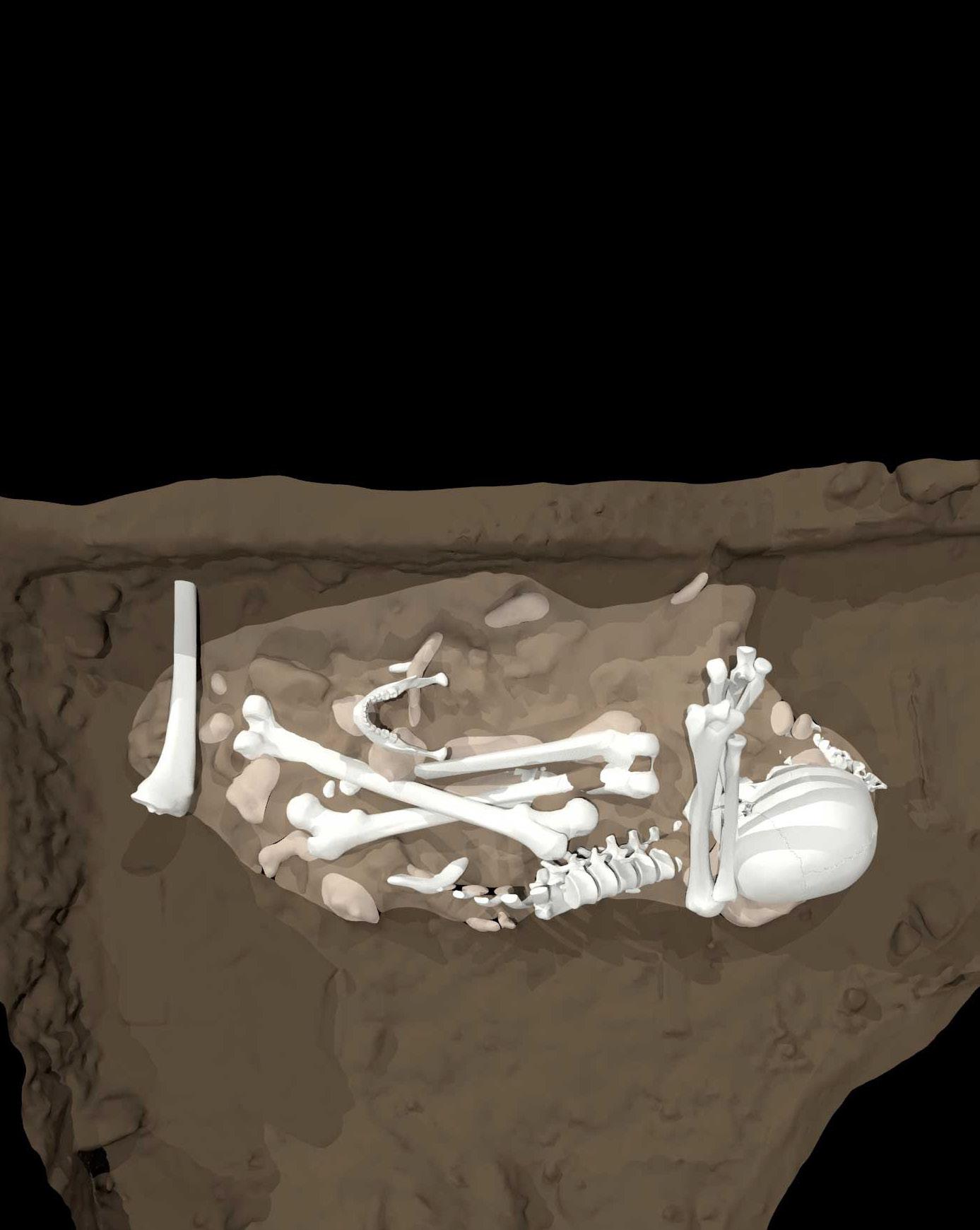
the grave. He states that the relationship between the bones is what a forensic scientist would expect to see if a body decomposed in a flexed position.
Members of the Forensic Science Research Group (FSRG) at Northumbria have published widely in forensic science and have contributed to casework in the investigation of major
crimes. Northumbria University has been ranked fourth in the UK for Forensic Science in the Complete University Guide 2024.
Click the QR code to find out more about the FSRG at Northumbria.

15 #TakeOnTomorrow NEWS
ARTIST’S RECONSTRUCTION OF THE BURIAL OF AN ADULT HOMO NALEDI FOUND IN THE RISING STAR CAVE SYSTEM
New training to strengthen nursing workforce
Northumbria University is one of just seven authorised providers of new NHS England funded training which aims to encourage more nurses to consider a career in general practice nursing.
NHS England has introduced new online training designed to make careers in general practice nursing more accessible following feedback from nurses on the challenges they face when applying for general practice vacancies. The training forms an important part of NHS England’s ongoing work to build a sustainable NHS workforce and improve the patient experience. Fully funded by NHS England, the national three-month module is one of a series of training programmes endorsed by Chief Nursing Officer for England, Dame Ruth May.
With a successful track record of providing primary care programmes, Northumbria University is one of a small number of providers authorised by NHS England to deliver the programme. Speaking at the launch of the new module in May, Dr Maggie Coates, Assistant Professor and Head of Subject (Health) within Northumbria’s Department of Nursing, Midwifery and Health,
said: “Qualified nurses can apply to work in GP practices when a vacancy arises, however, they may only have experience of acute nursing, rather than primary care nursing. These two areas are very different to work in. The idea of the module is to provide insight into the role so that any prospective applicants can demonstrate knowledge and understanding of the role and its responsibilities at interview.
“Allowing the targeted workforce an opportunity to gain a better understanding of working in primary care and general practice will support movement into roles in this sector. In turn this will support the growth of the nursing workforce and help in achieving the government’s pledge of recruiting 50,000 nurses into the workforce by 2025,” continued Dr Coates.
The training is available to nurses and nursing associates at all levels from pre-registration through to registered nurses working in different healthcare settings who want to start
a career in general practice. Topics include learning how the role fits within the multidisciplinary team, developing one-to-one communications skills and understanding how to operate in a primary care environment.
Karen Elton, Assistant Professor in Nursing and Programme Lead for the new training, added: “You can take your first steps into general practice by completing this online module, either at level 6 or 7 or as a non-accredited version. As the module is available online this gives you flexibility to complete it in your own time, fitting around your existing workload.”
Liz Fenton OBE, Deputy Chief Nurse at NHS England, said:
“We know that primary care and general practice provide some exciting career opportunities but nurses have told us that they have faced challenges when applying for vacancies.

“This is often because they are unable to evidence understanding of the work
“ALLOWING THE TARGETED WORKFORCE AN OPPORTUNITY TO GAIN A BETTER UNDERSTANDING OF WORKING IN PRIMARY CARE AND GENERAL PRACTICE WILL SUPPORT MOVEMENT INTO ROLES IN THIS SECTOR. IN TURN THIS WILL SUPPORT THE GROWTH OF THE NURSING WORKFORCE AND HELP IN ACHIEVING THE GOVERNMENT’S PLEDGE OF RECRUITING 50,000 NURSES INTO THE WORKFORCE BY 2025.”
within these areas, for example working on a ward can be very different to working alone in a treatment room.
“This module aims to provide support to those looking for their first role in primary care and general practice, helping them to develop skills and gain knowledge. Additionally, it will provide an overview of what it means to deliver local care for a population so that those considering a role can be fully informed.”
Northumbria is one of the top-rated universities for health care programmes in the UK, offering courses in Adult, Child, Mental Health and Learning Disabilities Nursing, Midwifery, Operating Department Practice, Physiotherapy and Occupational Therapy. For more information and to apply for the September intake of the new module, click the QR code.

16 NEWS Northumbria University NEWS • Summer 2023
DR MAGGIE COATES
NORTHUMBRIA HAS A SUCCESSFUL TRACK RECORD OF PROVIDING PRIMARY CARE PROGRAMMES.
Students on board with Metro’s green credentials

Transport operator Nexus has teamed up with Northumbria University business students to develop a campaign aimed at encouraging more passengers to ditch the car and use the Tyne & Wear Metro.

Students from the Business Clinic at Northumbria were tasked with capturing the Metro’s environmental credentials as a unique selling point to boost passenger numbers in line with, or above, pre-pandemic levels. Owned and operated by Nexus, the Metro is one of the country’s fastest-recovering light rail networks since passenger numbers dropped dramatically during Covid-19. However, Nexus is looking at more ways to help numbers recover to prepandemic levels.
The students – Ella Craggs, Nathan Binns, George Dawson and Elliot Cowie – carried out an in-depth audit focusing on the environmental benefits of Metro travel. They also undertook a survey to understand the travel habits of existing and potential passengers, revealing a concern
for climate change but also a lack of awareness of the Metro as a sustainable form of transport.
The students made a range of recommendations, including a physical marketing campaign with billboard advertising, posters and increased engagement with local schools via an art competition to coincide with the introduction of the new Metro fleet. Engaging with prominent social media influencers was also proposed, together with updates to the Metro app showcasing the environmental benefits.
Team leader Ella Craggs said: “It was fantastic to gain practical experience to complement our academic studies. We had an excellent
professional relationship with Nexus. They were easy to work with and gave us some really positive feedback on many of our ideas.”
Head of Corporate Planning at Nexus, Helen Mathews, was really impressed with the work the students produced, explaining: “They understood the brief well and came up with some novel recommendations that we can take forward as we seek to promote the environmental benefits of Metro travel to a wider audience – and increase passenger numbers to or even beyond levels seen before the pandemic.”
The Business Clinic at Northumbria University offers free consultancy support from final year students to SMEs,
multi-national organisations, charitable organisations, educational trusts and social enterprises that operate across a wide range of sectors.
Nigel Coates, Director of the Business Clinic, added: “We were delighted to work on such a worthwhile project with one of the country’s most prominent transport operators. The students were able to showcase their analytical skills and business acumen on a campaign that will reap tangible benefits for Nexus and the wider community.”
Click the QR code to read more about working with the Business Clinic.

“THEY UNDERSTOOD THE BRIEF WELL AND CAME UP WITH SOME NOVEL RECOMMENDATIONS THAT WE CAN TAKE FORWARD AS WE SEEK TO PROMOTE THE ENVIRONMENTAL BENEFITS OF METRO TRAVEL TO A WIDER AUDIENCE.”
HELEN MATHEWS, NEXUS
17 #TakeOnTomorrow
L-R: NATHAN BINNS, GEORGE DAWSON, ELLA CRAGGS AND ELLIOT COWIE WITH DAVID TURTON AND MATT GODWIN FROM NEXUS
Green report to parliament
The social, health and economic benefits of properly planned and managed green spaces have been highlighted in a report to parliament, compiled by environmental scientists from Northumbria University.

Professor Alister Scott and PhD researcher Matt Kirby examined academic research into the impact of Green Blue Infrastructure (GBI) on people’s lives. GBI is the name given to green spaces and water features designed to provide a range of multifunctional benefits. Examples include green walls and roofs; trees in urban areas; sea, ponds, rivers and canals; sustainable drainage systems; and parks and woodlands. Following their review, they produced a report, Green Blue Infrastructure Impacts on Health and Wellbeing; A Rapid Evidence Assessment, which has been distributed throughout parliament as part of the Research England-funded Capabilities in Academic Policy Engagement (CAPE) project, of which Northumbria is one of five partner universities.
CAPE is working to strengthen engagement between academics and policy professionals –including providing decision makers in parliament with evidenced based research to support and inform their policy making. The report has been published and distributed by the Parliamentary Office of Science & Technology, which provides parliamentarians with impartial, balanced and peerreviewed briefings.
Matt Kirby joined Northumbria in 2020 through the ONE Planet doctoral training partnership, jointly run by Northumbria and Newcastle Universities and funded through the Natural and Environmental Research Council (NERC). He and Professor Scott used state-of-the-art machine learning software EPPI-Reviewer to search for relevant existing academic
research around GBI, allowing them to compile their findings more quickly than if the search had been carried out manually. Speed is of the essence when providing parliament with academic evidence on pressing issues.
Speaking about the report Matt said: “Academic evidence isn’t usually easily embedded in policy making as it can be difficult to source and time consuming to compile, which is why approaches like rapid evidence synthesis is important in ensuring research is taken into consideration when making and scrutinising important policy decisions.
“It is widely accepted that green and blue spaces have a
positive impact on people’s lives, but there hasn’t been a great deal of research carried out about the impact of different types of managed Green Blue Infrastructure on specific mental and physical health conditions.
“We now hope that further longitudinal research will be carried out into how specific GBI might benefit a particular area or demographic, and into the issue of social equality around new and existing developments, so that more people can experience the benefits.”
Co-author Professor Alister Scott is one of the UK’s leading experts on nature and sustainable land use and was last year appointed as the sole special adviser

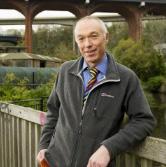
to the House of Lords Select Committee investigating land use in England. Speaking about the report he said: “All too often people see green spaces as a bolt on or luxury and a constraint on much needed development. The academic research amassed here shows green and blue infrastructure provides critical infrastructure for places and people, in effect representing a proactive natural health service and more which can help reduce local authority health burdens and improve productivity, regeneration, biodiversity and mitigate against climate change
if planned effectively.
“We still need more detailed health data to complement the self-reported data that abounds, but decision makers need to use this intelligence to embed the value of green and blue infrastructure into their policy and decision making.”
Click the QR code to read the Green Blue Infrastructure Impacts on Health and Wellbeing; A Rapid Evidence Assessment.

18 Northumbria University NEWS • Summer 2023
“DECISION MAKERS NEED TO USE THIS INTELLIGENCE TO EMBED THE VALUE OF GREEN AND BLUE INFRASTRUCTURE INTO THEIR POLICY AND DECISION MAKING.”
PROFESSOR ALISTER SCOTT
VIEW FROM RICHMONDPHOTO BY IAN THOMPSON ON UNSPLASH
Saving moths threatened by climate change
New research involving wildlife charity Butterfly Conservation and Northumbria University has shown that water management is key to tackling the decline in Britain’s cool-adapted moths.
Around 10% of the larger, socalled ‘macro’ moth species in Britain are currently restricted to areas with cooler climates; most of which are in the northern parts of Britain. Many of these moths have declined in geographical distribution over recent decades, leading to concerns that climate change could be driving these species to extinction.

Scientists, including Dr Andy Suggitt – a climate change ecologist from Northumbria’s department of Geography and Environmental Sciences – have now discovered that increasing the amount of water within habitats could be key to saving these species from rising temperatures.
Volunteers from Butterfly Conservation’s National Moth Recording Scheme gathered data over a 40-year period, showing that cool-adapted moths have retreated towards the North West, with some species dying out completely in more southerly and easterly parts. The garden tiger moth (Arctia caja) is
a typical example of this decline, whose numbers fell by some 89% between 1968 and 2002.
The study also highlighted that plants relied on by the moths’ caterpillars for food, survive better under warming temperatures when there is more rainfall. Therefore, it’s believed that the threat to moths would significantly reduce in hot climates where there is also high rainfall.
Postdoctoral Researcher at Butterfly Conservation, and lead author of the study, Dr Lisbeth Hordley explained why British moths are likely to be the first species to struggle: “Unfortunately, as climate change worsens, more areas in Britain will see the high temperatures that are driving these moths to extinction, so adapting land management to increase water retention is even more important to safeguard such species.”
Dr Suggitt goes on to explain:
“Our research suggests that we should take another look at how we manage water in
the landscape, particularly in the south and east of Britain, where warming has been more extreme.
“As the recent Intergovernmental Panel on Climate Change (IPCC) report concluded, species have responded remarkably consistently to warming temperatures – and we know this will ultimately result in a heightened risk of extinction for many species. But the picture has been less clear at the warmer edges of species’ ranges. Our new study contributes a small but important piece of that puzzle, while also offering a tangible option for conservation managers and practitioners to fight climate change by introducing relatively modest changes to water management.”
Changes in habitat management such as reducing overgrazing, slowing the flow of rivers, and blocking drainage ditches on peatlands could help retain water and benefit moths and other wildlife, as well as increasing carbon capture and
“OUR RESEARCH SUGGESTS THAT WE SHOULD TAKE ANOTHER LOOK AT HOW WE MANAGE WATER IN THE LANDSCAPE, PARTICULARLY IN THE SOUTH AND EAST OF BRITAIN, WHERE WARMING HAS BEEN MORE EXTREME.”
reducing flooding. Dr Richard Fox, Head of Science at Butterfly Conservation and co-author of the research, recognises that the work conducted by their volunteers offers invaluable solutions to prevent moth extinction. “Although it’s really bad news for the insects, the records gathered by these citizen scientists have also shown how we can increase the resilience of these species, at the same time as benefiting people, by retaining more water in river catchments.
“Existing Butterfly Conservation projects such as the Bog Squad, which is rewetting damaged peat bogs in Scotland, are already providing such benefits but much more is required to protect wildlife and people as the climate crisis grows.”
Click the QR code to find out more on the research in a paper published in the academic journal Ecology Letters.

19 #TakeOnTomorrow
DR ANDY SUGGITT
A GARDEN TIGER MOTH IN LONG GRASS. PHOTO: GETTY IMAGES
A project tackling plastic pollution on the Kenyan coastline is now at the centre of new research which shows microfibres from washing textiles and clothing can also harm the environment.

The effect of plastic pollution on marine life has been welldocumented in recent years through projects such as the Flipflopi – a movement established by Northumbria alumnus Ben Morison and supported by the University’s academics and researchers. The Flipflopi project has recovered 135 tonnes of plastic waste in the last 10 months alone from the Lamu Archipelago on the coast of Kenya.
The project is best known for building the world’s first 100 per cent recycled plastic sailing boat from discarded plastic, including 30,000 discarded flip flops, which are commonplace in the world’s oceans.
But plastic waste isn’t the only ocean pollution issue. A new collaborative research paper highlights the risks posed by the microfibres – which can be synthetic (plastic) and non-synthetic – released from textiles and clothing.
To better understand this risk, researchers from Northumbria and King’s College London worked with the Flipflopi team to gather and examine water samples taken from 37 sites along the Kenyan and Tanzanian coast. Over half of the samples contained natural microfibres from wool, cotton, silk, vegetables and minerals.
The wastewater from washing machines contributes to the presence of microfibres in the ocean. However, even washing clothes by hand can release microfibres, with estimates suggesting that less than a quarter of households in Kenya use washing machines. Instead, many wash clothes by hand with the run-off wastewater making its way into the ocean.
Dr Kelly Sheridan, an Assistant Professor of Forensic Science from Northumbria’s Department of Applied Sciences, was part of the research team looking specifically at the abundance of microfibres and their impact.
Wastewater microfibres may harm East African ecosystems
“Textile fibres, known as microfibres, and their prevalence in the environment have been studied by forensic scientists for decades,” explained Dr Sheridan. “However, the majority of recent environmental studies have overlooked that knowledge and focused only on the characterisation of microplastic fibres. This has led to inaccurate microfibre data and much misunderstanding in the literature, culminating in a general underestimation of the threat posed by natural fibres. “These research outcomes have demonstrated the strength of cross-collaboration, bringing together designers, environmental scientists and
forensic scientists to tackle a global environmental challenge. We need to foster a noregrets approach, leveraging from others’ expertise if we are to fully understand environmental challenges and develop appropriate solutions to overcome them.”
Dr Matteo Gallidabino, Lecturer in Forensic Chemistry at King’s College London, said: “We need to increase awareness of the environmental impact of the textile industry. Even if the clothes we wear are composed of natural materials, such as cotton or wool, some the textile fibres they are made of can find their way into the environment and, potentially, accumulate
into living organisms. These may be very harmful and have significant effects on biodiversity.”
Simon Scott-Harden, an Assistant Professor at Northumbria’s School of Design, is part of the Flipflopi team and was involved in the engineering and design of a model Flipflopi sailing boat which is currently touring museums across the world as part of an exhibition called Plastic: Remaking Our World.
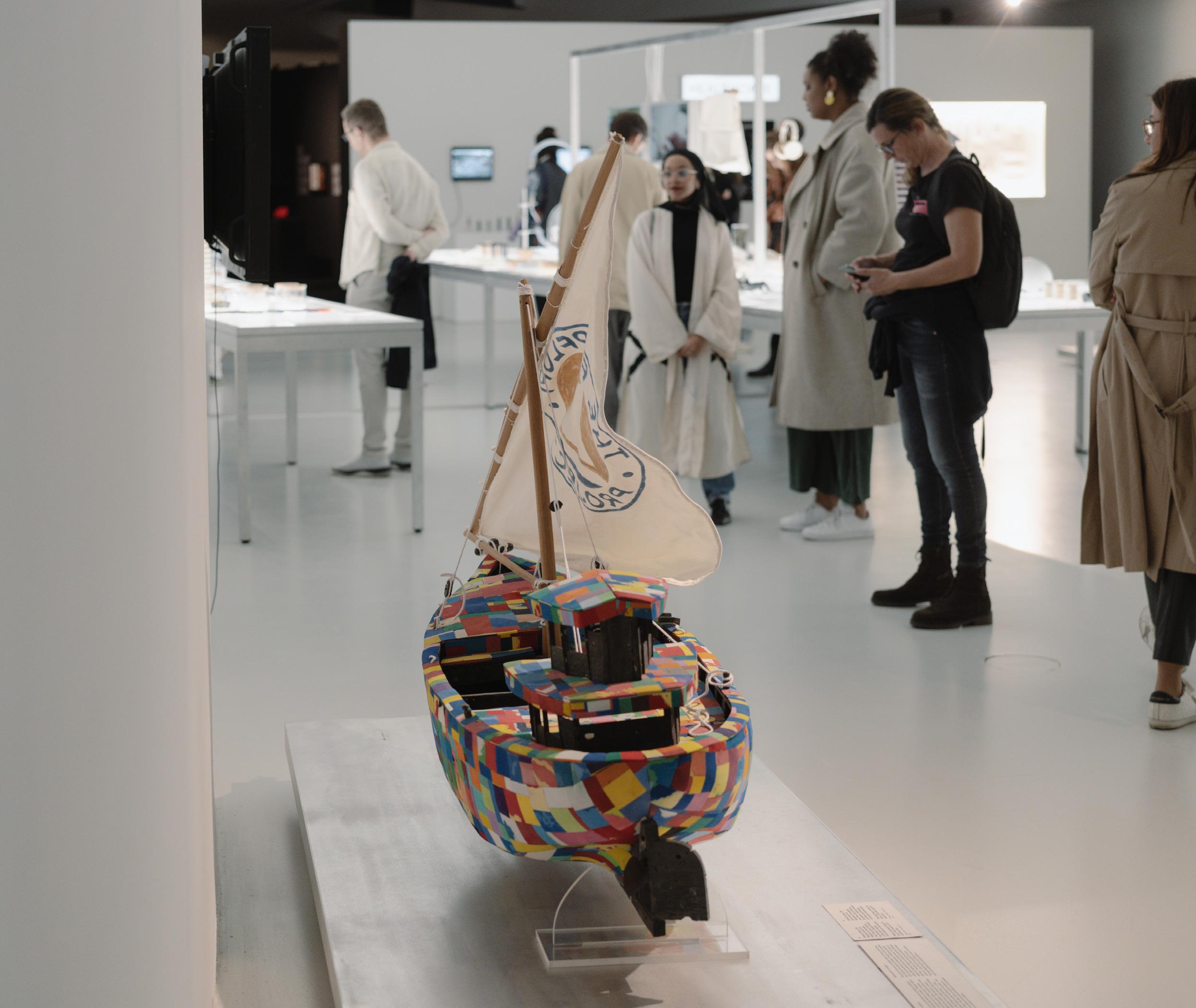
He explained: “We adopt what we call a full systems approach to influence behaviour change, made up of research, education, innovation and captivating campaigns to keep the issue
of plastic pollution front of mind. The exhibition is a great example.”
The research, Prevalence and characterisation of microfibres along the Kenyan and Tanzanian coast, has been published in the academic journal Frontiers in Ecology and Evolution.
Click www.theflipflopi.com for more information about the Flipflopi project and scan the QR code to read the research paper.

20 Northumbria University NEWS • Summer 2023
THE MODEL FLIPFLOPI SAILING BOAT PICTURED ON DISPLAY IN THE MUSEUM OF ART, ARCHITECTURE AND TECHNOLOGY IN LISBON AS PART OF THE PLASTIC: REMAKING OUR WORLD EXHIBITION.
PHOTO BY JOANA LINDA © EDP FOUNDATION
“THESE RESEARCH OUTCOMES HAVE DEMONSTRATED THE STRENGTH OF CROSSCOLLABORATION, BRINGING TOGETHER DESIGNERS, ENVIRONMENTAL SCIENTISTS AND FORENSIC SCIENTISTS TO TACKLE A GLOBAL ENVIRONMENTAL CHALLENGE.”
Plastic waste sorting at the Lamu material recovery centre in Kenya.
Photo by Umber Studios
DR KELLY SHERIDAN
Scientists at Northumbria University have developed a sustainable solution for drinking water –a portable, solar powered system which absorbs moisture from the air and turns it into clean water.
According to the United Nations, one in three people worldwide still live without access to safe drinking water, sanitation and hygiene services, a problem which is only worsening with climate change, conflict and population growth. This lack of access to water leaves communities across the globe exposed to water and sanitation related diseases, with over 800,000 people estimated to die each year from diarrhoea alone. In a bid to bring water to parched communities, academics at Northumbria have developed a sustainable solution for clean drinking water that can be deployed to rural communities and set up easily and economically without scientific know-how.
Over the last decade, Dr Muhammad Wakil Shahzad, Assistant Professor in Northumbria’s Department of Mechanical and Construction Engineering, has been developing pioneering solutions to help tackle water scarcity. His latest project has seen the creation of ‘Solar2Water’, which uses solar energy to extract moisture from the air and turn it into safe drinking water. The patented Solar2Water system overcomes the limitations of similar water generators available on the market, with one major advantage being that it can produce a constant amount of water, regardless of the outside air humidity. It also generates double the amount of water using the same amount of energy when compared to existing systems.
Running on solar energy alone, the unit features two solar panels, which, once unfolded, begin harnessing energy from the sun to kick-start water production. A battery system that stores that energy during the day and releases it at night enables 24-hour operation. No training or experience is required
“PRODUCING
Making water out of thin air and sunlight
to use the system and its robust mechanical build means it can be operated in any environment. This allows Solar2Water to be deployed quickly and easily to any location, such as disaster zones, field hospitals, offices, refugee camps, army camps and remote communities where there is no grid connection or water availability nearby.
Dr Shahzad’s technology could be game-changing in helping to achieve sustainable water supplies in underdeveloped areas and will help to progress the UN’s Sustainable Development goal of ‘Clean Water and Sanitation for All’.
Speaking about the project, Dr Shahzad said: “Previously I have done a lot of work on large hybrid water plants, especially in Saudi Arabia, where we successfully commercialised a seawater desalination system. During that experience, I learned that the most ignored communities are the remote and non-coastal communities,
where they don’t have any grid connection or water supplies. That is where the inspiration for this project came from, with the idea being to develop this decentralised water solution, to provide water for remote communities, refugee camps and even field hospitals, using solar energy and the ambient air. Importantly, Solar2Water also has the potential to help women and girls in remote communities, who often spend hours each day walking miles to collect water. Producing water from air at their locality using solar energy can help remove barriers to education and recreational activities, ultimately helping communities to escape poverty.”
Dr Shahzad secured initial funding from Northumbria to demonstrate the Solar2Water concept. Following the successful development of the prototype in the lab, Dr Shahzad was granted proof-of-concept funding from Northern Accelerator, an

exciting collaboration between the North East’s universities, set up to create real-world impact from world-leading research, commercialising innovation and boosting the region’s economy. The pilot system can produce enough water for three to four households – 15 to 20 litres per day – but the team behind Solar2Water have plans to upscale the production capacity to 50 litres per day, so that one unit can produce enough drinking water for a small community. The proof-of-concept funding is supporting the scaleup and commercialisation of Solar2Water. Their ultimate aim is to launch a Northumbria spinout company that could mass produce the units to supply to communities in need worldwide.
Tim Hammond, Programme
Lead of Northern Accelerator and Director of Commercialisation and Economic Development at Durham University, said: “There
is significant potential for the excellent research conducted in the North East’s universities to help address some of the challenges we face regionally, nationally and globally. Northern Accelerator has transformed university spinout performance from the region’s universities, helping academics use their research to achieve real world social and economic impact. Our integrated approach to the commercialisation ecosystem includes providing funding for proof-of-concept projects.
Northern Accelerator are pleased to be able to support Dr Shahzad with this funding - to help bring the technology closer to being a commercial product that can be made available to those who struggle with access to clean drinking water.”
Click the QR code to watch a video about Solar2Water.

21 #TakeOnTomorrow
WATER FROM AIR AT THEIR LOCALITY USING SOLAR ENERGY CAN HELP REMOVE BARRIERS TO EDUCATION AND RECREATIONAL ACTIVITIES, ULTIMATELY HELPING COMMUNITIES TO ESCAPE POVERTY.”
DR MUHAMMAD WAKIL SHAZAD
The Solar2Water team, L-R: Muhammad Wakil Shahzad, Muhammad Ahmad Jamil, Mohammed Sanjid Thavalengal, Muhammad Mehroz, Nida Imtiaz (not pictured)
Lasting tribute to original feminist
“WE HOPE THE PLAQUE PROJECT WILL ALLOW US TO REACH OUT TO THOSE INTERESTED IN COMMEMORATING INSPIRATIONAL WOMEN FROM NEWCASTLE AND THE REGION, AND THAT THIS WILL INSPIRE YOUNG GIRLS AND WOMEN TO PURSUE THEIR OWN AMBITIONS AND FULFIL THEIR POTENTIAL.”
The life and work of a North East woman, described as ‘the first English feminist’, have been officially recognised with a commemorative plaque dedicated to her outside Newcastle Cathedral.
Academics from Northumbria University recently joined forces with Newcastle Cathedral and Newcastle City Council to create a lasting memorial to the 17th century writer and poet, Mary Astell. Born in Newcastle in 1666, Mary was an advocate of equal educational opportunities for girls. She lived in the region until her twenties, when she moved to London and established a charity school in Chelsea.
On 8 March this year –International Women’s Day – people from across the North East gathered at Newcastle Cathedral for a special event celebrating local groups and individuals working to empower women. This was followed by the unveiling of the plaque commemorating Mary’s life and her connection to the city.
Dr Claudine van Hensbergen, of Northumbria University’s Institute of Humanities, proposed the plaque and hopes it will be the first step in recognising many more of
the North East’s inspirational women.
As she explains: “We might think of Astell as ‘the other Mary’. She explored many of the same ideas as the radical proto-feminist thinker, Mary Wollstonecraft but lived a century earlier. Wollstonecraft now has a monument, and we thought Astell should be publicly remembered too.
“We hope the plaque project will allow us to reach out to those interested in commemorating inspirational women from Newcastle and the region, and that this will inspire young girls and women to pursue their own ambitions and fulfil their potential.”

The plaque was unveiled by the Sheriff of Newcastle, Councillor Veronica Dunn; and Jane Hedges, Acting Dean of Newcastle. Ahead of the unveiling a number of ‘Women Behind the Stones’ tours took place, highlighting some of the trailblazing women remembered within the Cathedral. A ‘Working

with Women’ showcase event was also held, celebrating the organisations and individuals in the region who support and promote the rights and lives of women.
Northumbria University Postgraduate Researcher Daisy Winter helped coordinate the event and said: “The aim of the showcase was to raise awareness of vital projects and organisations that further the interests of women. This is entirely in keeping with the extraordinary work of Mary Astell, who published innovative writings arguing that women were just as rational and intelligent as men and lobbied both for the need to widen women’s access to education and proposed
DR CLAUDINE VAN HENSBERGEN
solutions to the problems many women faced in marriage.”
Mary Astell had strong links with Newcastle Cathedral, or St Nicholas’s Church as it was known in her lifetime. Her uncle Ralph Astell was the church curate. A Cambridge graduate, he educated Mary using books from the church library as well as his own collection, which he left to her upon his death. Mary was baptised in the nearby St. John’s Church, where four generations of her family were buried.
Newcastle City Council’s commemorative plaques scheme exists to highlight people, places and events from the city’s history that have the power to educate, surprise or inspire people to this day. The scheme aims to contribute to telling the story of Newcastle in all its richness
and diversity, including elements of this story which have been under-represented. Anyone can nominate a new commemorative plaque through the Newcastle City Council website, and recent years have seen a growing number unveiled to women.
Cllr Lesley Storey, Newcastle City Council cabinet member for a Vibrant City, said:
“Mary Astell was a pioneer of women’s rights, advocating for equalities before many of the more-widely celebrated historical figures who have fought for this cause. We were proud to support this plaque to help share the story of Mary Astell and hopefully inspire more people to champion a cause she was passionate about, and it’s only fitting that we were able to do so on International Women’s Day.”

22 Northumbria University NEWS • Summer 2023
L-R: DAISY WINTER, NORTHUMBRIA UNIVERSITY POSTGRADUATE RESEARCHER; JANE HEDGES, ACTING DEAN OF NEWCASTLE; DR CLAUDINE VAN HENSBERGEN, OF NORTHUMBRIA UNIVERSITY; AND THE SHERIFF OF NEWCASTLE, COUNCILLOR VERONICA DUNN
Click the QR code to find out more about the life of Mary Astell.
Major study into role of WW2 conscientious objectors
In the first major study of WW2 conscientious objectors, Dr Linsey Robb will examine the reasons why people applied for exemption from conscription, the impact it had on their lives, and the contribution they went on to make to the war effort. Her research project, British Conscientious Objection in The Second World War, has received more than £180,000 funding from the Arts and Humanities Research Council (AHRC) and will examine written and oral histories of conscientious objectors stored at the Imperial War Museum in London, and libraries and archives across the UK.

As Dr Robb explains: “There is often a misconception around the role conscientious objectors played during the Second World War. Although they objected to fighting, many of them still played an active role in both military and civilian activity, for example ambulance drivers or medics, while others supported the war effort through agricultural activity. During the war, conscientious objectors were working all over the world, including in China, Africa and across Europe, and yet their experiences really haven’t been explored in detail until now. Although sadly most are no longer with us, they were generally very
articulate and intelligent men, many of whom left behind detailed written or oral observations of their experiences, which I will be drawing on for this research.”
There were almost 60,000 conscientious objectors during WW2, with many objecting to fighting on religious grounds, including a large number of Quakers – a traditionally pacifist faith. However, unlike the First World War, when conscientious objectors were shunned by society and often ended up in prison, by the Second World War the British government had realised they could still play a vital role in the war effort, even if they were not
required to go before a tribunal where they would set out their reasons before a judge. They would then either be refused, given an alternative role, or completely exempted. One well known example of a conscientious objector is Roy Broadbent, the father of Oscar-winning actor Jim Broadbent, who along with his wife Dee was part of a small community of conscientious objectors who set up a farming cooperative in rural Lincolnshire.
As part of her research Dr Robb will be working with the Peace Museum in Bradford – the only museum dedicated to the history and stories of peace, peacemakers and peace movements, in the UK. Together they will run a series of workshops with school children, educating them about conscientious objection during the war, but also drawing parallels with modern-day activism, including the Black Lives Matter
The stories of conscientious objectors, and their reasons for objecting still resonate today, and so exploring their histories can help us understand contemporary activism, and the state’s response.”
Charlotte Houlahan, Curator at the Peace Museum, added: “We’re thrilled to have been asked to get involved in this project. There are important lessons to be learned both from the stories of conscientious objection and the stories of modern-day activism in our collection, and we’re excited to explore these connections with the next generation of peacemakers.”
Click the QR code to find out more about studying History at Northumbria University.

23 #TakeOnTomorrow
The stories of the British men who chose not to fight in the Second World War due to their moral, political or religious beliefs are to be explored by a Northumbria University historian.
DR LINSEY ROBB
“THE STORIES OF CONSCIENTIOUS OBJECTORS, AND THEIR REASONS FOR OBJECTING STILL RESONATE TODAY, AND SO EXPLORING THEIR HISTORIES CAN HELP US UNDERSTAND CONTEMPORARY ACTIVISM, AND THE STATE’S RESPONSE”
Mapping support for people facing homelessness
Researchers at Northumbria University have been working with support services and community organisations on developing improved data sharing techniques to support people experiencing homelessness after winning funding of almost £250,000.
The Northumbria team, led by Professor Monique Lhussier, are working with housing services, NHS providers, charities and community groups, to involve people from across the North East and North Cumbria who have experienced periods of homelessness, after recruiting them as experts by experience. Their knowledge has helped to guide and shape aspects of the research since it got under way earlier this year.

The nine-month project will include the creation of a virtual directory to map the services and options available for those facing homelessness and associated complex social and healthcare needs. This will also be made available to service providers to help further develop more integrated and connected ways of working.
Professor Lhussier said: “The project brings together a range of services, academics and people who have been homeless to work together to improve the health and wellbeing of all community members. We are working in
direct and equal collaboration with people who have experienced homelessness so that all people can have access to the support they need, when they need it, and in the way they need it.

“We know, for example, that if someone is homeless and also dealing with mental health issues and addiction, they will be faced with disconnected support services to deal with each challenge. But often support with addictions will not be activated until mental health issues are stabilised, and vice versa, leaving people to fall between the cracks, as housing can also be dependent on those issues being resolved. People’s lives do not fit into neat boxes and this project is about building a network of services that can be shaped more around the person, rather than the other way around.”
Information gathered during the research will also be used to build on an existing model of support used by the Joseph Cowen Health Centre in Byker, Newcastle upon Tyne, run by one of the project partners, Tyne Housing. With
support from the North East and North Cumbria Integrated Care Board and Newcastle City Council, the centre operates as a health and wellbeing drop-in service for people experiencing homelessness in the city.
Steve McKinlay, Chief Executive of Tyne Housing said: “This project will help us to use the knowledge and experience of people who have lived through periods of homelessness and the life challenges that presents, to improve the connectivity of support services for the benefit of all.
“Our housing model is always designed to focus on the individual’s own personal needs, meeting them where they are, building a trusting relationship and working together in partnership to get to a better place.
“We feel working collaboratively on this research with Northumbria
University, to find ways of addressing the inequalities faced by people who find themselves homeless, is an important mechanism to help improve the lives of people across the region and beyond.”
Up to 40 stakeholders from across the North East and North Cumbria have been invited to take part in a series of workshops to support the research project in recent months. A dissemination event to share findings with decision makers from key organisations is planned for July.
Other partners on the project include the Voluntary Organisations’ Network North East; the NIHR Applied Research Collaboration (ARC) North East and North Cumbria (NENC); Fuse, the Centre for Translational Research in Public Health; the Deep End network and the North East and North Cumbria Integrated Care System (ICS).
The research, Building and Evidencing Community Asset Partnerships in Housing and Health to Address Health Disparities in the North East and North Cumbria, is one of a wave of projects which form part of a £26 million UK Research and
Innovation (UKRI) and Arts and Humanities Research Council (AHRC) investment, aimed at using existing local resources to create a fairer and healthier society.
Professor Helen Chatterjee, AHRC’s Health Inequalities Programme Director said: “We must think carefully about how we utilise shared infrastructure and spaces to ensure that they are serving the entire community and playing their role in addressing inequality. It is exciting to consider how bringing together and rethinking the use of cultural assets in these regions might change health outcomes for their communities.”
Based within Northumbria’s Department of Social Work, Education and Community Wellbeing, Professor Lhussier is also Director of CHASE, Northumbria’s flagship Centre for Health and Social Equity. The centre will harness and develop the University’s research, education and knowledge exchange expertise to help meet the health and social equity issues of multiple stakeholders and communities in the city, region and beyond.
Click the QR code to discover more about CHASE.

24 Northumbria University NEWS • Summer 2023
“WE MUST THINK CAREFULLY ABOUT HOW WE UTILISE SHARED INFRASTRUCTURE AND SPACES TO ENSURE THAT THEY ARE SERVING THE ENTIRE COMMUNITY AND PLAYING THEIR ROLE IN ADDRESSING INEQUALITY.”
PROFESSOR HELEN CHATTERJEE, AHRC’S HEALTH INEQUALITIES PROGRAMME DIRECTOR
THE JOSEPH COWEN HEALTH CENTRE IN BYKER, NEWCASTLE, OPERATES AS A HEALTH AND WELLBEING DROP-IN SERVICE FOR PEOPLE EXPERIENCING HOMELESSNESS IN THE CITY
Success for innovative elderly care programme
Northumbria University researchers are celebrating a key milestone in the development and delivery of an innovative new programme designed to improve care for older people.
David is “living the dream”
The Enhanced Care for Older People (EnCOP) programme was created to support those working with older people in health and social care settings, including nurses, doctors, paramedics, social prescribers and pharmacists and social workers. It provides education, resources, networking opportunities, career development and research centred on highquality, evidence-based care.
Developed in partnership with the North East and North Cumbria Ageing Well Network, the programme aims to better understand the challenges associated with caring for older people, and the development needs of people working in the sector.

The first cohort of 50 professionals to undertake the new programme have now graduated and in recognition of the programme’s success to date, it was named as a finalist in the Innovation in Clinical Education category at the Bright Ideas in Health Awards.

Dr Claire Pryor, Assistant Professor of Adult Nursing and joint lead on the project said: “While older people are the biggest consumers of care, they are also the group most likely to have unmet needs. But we are helping to provide a solution by defining and providing guidance and best practice around what the workforce needs to be able to better support and care for them.”
Project co-lead Sue Tiplady, Assistant Professor of Adult Nursing at Northumbria University commented: “EnCOP is a great way to raise and celebrate the value and profile of working with older people. For too long caring for older people has been seen as a less attractive option for people to work in, with little recognition of the knowledge, skills, values and attitudes that staff require to care for the diversity and complexity of older people. It’s time for staff to be proud and celebrate that they work with older people.”
Click the QR code to discover more about Northumbria’s Department of Nursing, Midwifery and Health.


David Staple’s last on-campus university experience was in 1972 when he studied for his degree in Economic and Social History at York University. After qualifying as a teacher, he taught history for 11 years before working for several local authorities in education management roles. He then became an advisor for the UK Government, under former Prime Minister Tony Blair, where he worked on a strategy for raising standards across schools. David studied online part-time for a master’s in history from Huddersfield University and after running his own company for a period, decided to retire. But it wasn’t long before he decided to embark on a new challenge.
“I was looking for something to do,” he said. “And then along came this opportunity to work with Dr Connal Parr, an academic in History at Northumbria University, and I was immediately interested. I have a longstanding interest in the Northern Ireland conflict, in which Connal is a renowned expert. I was thrilled to have my PhD application accepted and to be able to study with Connal as my supervisor. It’s very special to be working under his guidance as he is a young and forward-thinking expert on history, politics and society in Ireland.”
David began his PhD about Music and The Troubles in Northern Ireland between 1969 and 1998 at Northumbria University, in October last year. The three-year full-time doctorate will examine how musicians, particularly rock and folk musicians, tackled the Northern Ireland Troubles and how Irish communities came together for music concerts, despite the longstanding grievances between Catholics and Protestants who held deeply opposing views on Northern Ireland’s relationship with Great Britain. Having been a student at Northumbria for over eight months now, David is full of praise for the University’s, staff, facilities and fellow students. “I would recommend Northumbria as a comfortable, stimulating and welcoming place to study, with opportunities to take part more widely in subject-related events,” he said. “The other students here
treat me as an equal, not ‘the older guy’ and I find everyone to be warm and open-minded. The library staff at Northumbria are particularly helpful. There is a superb collection of books on Irish history, and great opportunities to use online resources as well as obtain books from other libraries in the UK and overseas.
“The idea behind doing this PhD was always to enjoy the research and combine it with detailed onthe-ground research in Ireland. I want it to be fun, and so far, it has been. Now that I’m approaching 70, it feels like I’m living the dream.”

Northumbria’s History
PhD students are studying a diverse range of topics, supported by new research-active staff. The University’s Department of Humanities offers a stimulating environment for research discussions and students participate in the full range of on-campus research.
Click the QR code to learn more about Northumbria’s postgraduate research.
25 #TakeOnTomorrow
A retired education advisor isn’t letting his age hold him back, as he embarks on a Doctor of Philosophy (PhD) at Northumbria University, aged 69.
“THE OTHER STUDENTS HERE TREAT ME AS AN EQUAL, NOT ‘THE OLDER GUY’ AND I FIND EVERYONE TO BE WARM AND OPENMINDED.”
DAVID STAPLES
Call for better support for military widows
People whose partners died while serving in the Armed Forces say they feel overlooked and let down by the military community, according to a report published by Northumbria University.

A study carried out by Northumbria’s Northern Hub for Veterans and Military Families Research found that two in five military widows feel lonely or socially isolated. The report, Exploring Military Widows Experiences of Social Isolation and Loneliness, which was funded by Forces in Mind Trust and supported by the War Widows Association, revealed that many Forces’ widows feel abandoned by the military community and unable to get the help they need.
Participants who shared their personal experiences as part of the research highlighted what they felt to be a ‘hierarchy of death’ within some organisations. Some participants who lost their husbands to illness or suicide or whose husbands died after leaving the Forces, reported feeling less worthy than wives whose husbands died in combat. The report also suggests that some do not receive support because of confusion about the terms ‘military widow’ and ‘war widow’, and the fact that different charities have different eligibility criteria.
Gail Austen’s husband, Steve, was diagnosed with testicular cancer just days after their wedding. He continued to serve in the RAF for three and a half years until his death in 1999. She said: “I received an enormous amount of help from a range of people at the station, but felt like my world had collapsed around me and I had been cut adrift. I had lost my husband, my home, my future and my dreams. I didn’t access some support I might have
been able to seek out after his death, because I felt it didn’t apply to me because of how Steve died – I felt like it didn’t count.”
Christine Dziuba, now a Trustee for the War Widows Association, joined the RAF Nursing Service in 1976. While she was serving at the RAF Hospital in Ely in 1980, she met and married her husband Steve, an RAF Air Traffic Controller. Steve was diagnosed with a rare form of lymphoma in 2004 and died 18 months later. She said: “After he died, I was told I would always be a part of the RAF family and welcome on the station, but the attention quickly waned leaving me with the feeling that I was an embarrassment to the RAF. Within a fortnight of Steve’s death, I was asked to return my dependant’s pass, which allowed me to get on to the station, visit the thrift shop, the wives club and the coffee shop.”
Social isolation and loneliness are widely acknowledged as being linked to poor physical health and wellbeing, including an increased risk of high blood pressure, cognitive decline, depression, and death. The research team are now calling for improvements to the support available, not just directly after bereavement but in the months and years that follow.
Dr Gill McGill is Co-Director of The Northern Hub for Veterans and Military Families Research and Assistant Professor in Social Policy and Health at Northumbria University. She explained: “Losing a partner is difficult
“WE HOPE THAT THIS RESEARCH WILL PROVIDE AN EVIDENCE-BASE TO DRIVE CHANGE AND INCREASE AWARENESS AND RECOGNITION OF THE ROLE FAMILIES PLAY IN THE EFFECTIVENESS OF OUR ARMED FORCES AND ENSURE THAT BEREAVED SPOUSES IN PARTICULAR ARE NOT FORGOTTEN.”
DR GILL MCGILL
for anyone, but when that also means you have to move quickly out of the military community and into civilian life it can be particularly difficult. For some participants who took part in the study it led to feeling socially isolated and there was a strong sense of a complete loss of identity. Some of the participants talked about feeling ‘cut off’ from the military community they were once part of, uprooted from their close-knit community and even abandoned. We hope that this research will provide an evidence-base to drive change and increase awareness and
recognition of the role families play in the effectiveness of our Armed Forces and ensure that bereaved spouses in particular are not forgotten.”
The study is one of several projects the Hub has worked on together with the military bereaved community. This work led to the team being invited to present evidence to the House of Lords in March this year. Following the event, The Rt Hon Johnny Mercer MP, Veterans’ Affairs Minister, tweeted: “It was excellent to attend this @Northern_Hub event yesterday to support their work with the military
bereaved community. Research from academics at @NorthumbriaUni has revealed the true experiences of bereaved military families, following a first-of-its-kind study exploring the impact of death in military service on surviving family members.”
Click the QR code to find out more about the Northern Hub for Veterans and Military Families Research.

26 Northumbria University NEWS • Summer 2023
Infant mental health researcher honoured for pioneering work
An Associate Professor at Northumbria University has won a prestigious award from the UK’s leading membership group for experts on infant mental health, in recognition of his outstanding research.

Dr Ian Robson, a qualitative researcher and teacher in the Department of Social Work, Education and Community Wellbeing, has been awarded the Association of Infant Mental Health (AIMH) UK Louise Emanuel Award.
Named in honour of the pioneering child psychotherapist who passed away in 2017, the accolade recognises Dr Robson’s contribution to practice, research and policy, and his commitment to the 1,001 Critical Days agenda. The agenda recognises the time period from conception to the age of two as the crucial foundations for lifelong emotional and physical wellbeing and is designed to give babies the best start in life.
Dr Robson collaborates with and amplifies the voices
of frontline practitioners working directly with children and families, particularly in Newcastle, where there is disproportionate disadvantage compared to other areas.
Dr Robson explained:
“Partners on the 1,001 Critical Days agenda, such as Action for Children, are working meaningfully with families and can advocate on their behalf, in a consultative rather than a bureaucratic way.
“What we do in Newcastle, which is highly multi-cultural with lots of different family structures and identities, has a national context in terms of developing safe, consistent responsiveness to issues affecting the health outcomes of children.”
Before joining the University almost 15 years ago, Dr Robson managed both local authority
children’s services and Sure Start provision, offering integrated family support that focused on early intervention and prevention.
Amongst other roles, he is Chair of Newcastle’s 1,001 Critical Days Think Tank, Engagement and Impact Lead for KERNEL Early Life Research Consortium. He added: “I have a team of really valued colleagues
who keep babies in mind in everything they’re doing because they don’t have a voice in the system. We know from research that interventions at this time of life are incredibly important, yet very young children are often excluded from the design of public services, such as play and regeneration schemes.”
Dr Robson was nominated for the award by fellow
lecturer Donna Carlyle and endorsed by his University colleague, Professor of Education Elizabeth Hoult, as well as paediatric clinician Sunil Bhopal from Newcastle University among others. AIMH said: “Since 2017, Dr Robson has been actively key to building collaboration between agencies and partnerships across Newcastle City Council.
“Throughout his career, he has championed infant mental health and community wellbeing has been at the heart of his research. His unwavering dedication, enthusiasm, commitment and support for organisational and systemic change and progress is commendable. He has undertaken various projects which demonstrate his desire for partnership, collaboration and working together across the city.”
Dr Joanne Atkinson, Head of the Department of Social Work, Education and Community Wellbeing added: “This award represents brilliant recognition, not only for Dr Robson’s incredible work, but for the contribution such research makes to wider society, as we continue to strive for early intervention with children and families in addressing health inequalities. This is key to our aims and objectives for both the Department and our Centre for Health and Social Equity.”
Click the QR code to discover more about the 1,001 Critical Days Agenda.

27 #TakeOnTomorrow
L-R: Sally Noden and Val Hobson of Action for Children with Dr Ian Robson
ASSOCIATION OF INFANT MENTAL HEALTH (AIMH)
“SINCE 2017, DR ROBSON HAS BEEN KEY TO BUILDING COLLABORATION BETWEEN AGENCIES AND PARTNERSHIPS ACROSS NEWCASTLE CITY COUNCIL.”
Research funding gives hope for sight loss breakthrough
“THE FACT THAT GERRIT HAS SECURED THIS AWARD IS TESTAMENT TO THE EXCELLENCE OF HIS RESEARCH AND CLEAR FUTURE PROMISE TO BECOME A LEADER IN HIS FIELD, AS WELL AS TO THE QUALITY OF THE ENVIRONMENT WE OFFER AT NORTHUMBRIA FOR DEVELOPING RESEARCHERS.”
PROFESSOR DIANNE FORD
The award, from the Academy of Medical Sciences’ Springboard scheme, will help fund groundbreaking techniques to study age-related macular degeneration (AMD), a common disease that affects vision, particularly in the elderly. It is believed that the research, led by Dr Gerrit Hilgen, Assistant Professor in Neuroscience at Northumbria, has the potential to lead to new treatments for AMD and could also help develop new and faster ways to diagnose and prevent the condition.
The macula is part of the retina at the back of eye that allows you to see fine detail and is responsible for our central vision. Macula cells can deteriorate for a number of reasons, the most common being ageing, but smoking, poor diet, high blood pressure and genetic history can all play a part too. The risk of developing advanced age-related
macular degeneration increases from 2% in those aged 50-59, to nearly 30% for those over the age of 75. In 2020, the condition was believed to affect more than 190 million people globally and this figure is expected to rise to 288 million people by 2040 as the elderly population increases.
The symptoms of AMD include blurred vision, difficulty seeing in low light, and seeing straight lines as wavy. The condition can develop slowly over several years or conversely can develop very quickly. To date, there is no cure.
The funding of £100,000 will support the study into the causes of AMD at a cellular level.
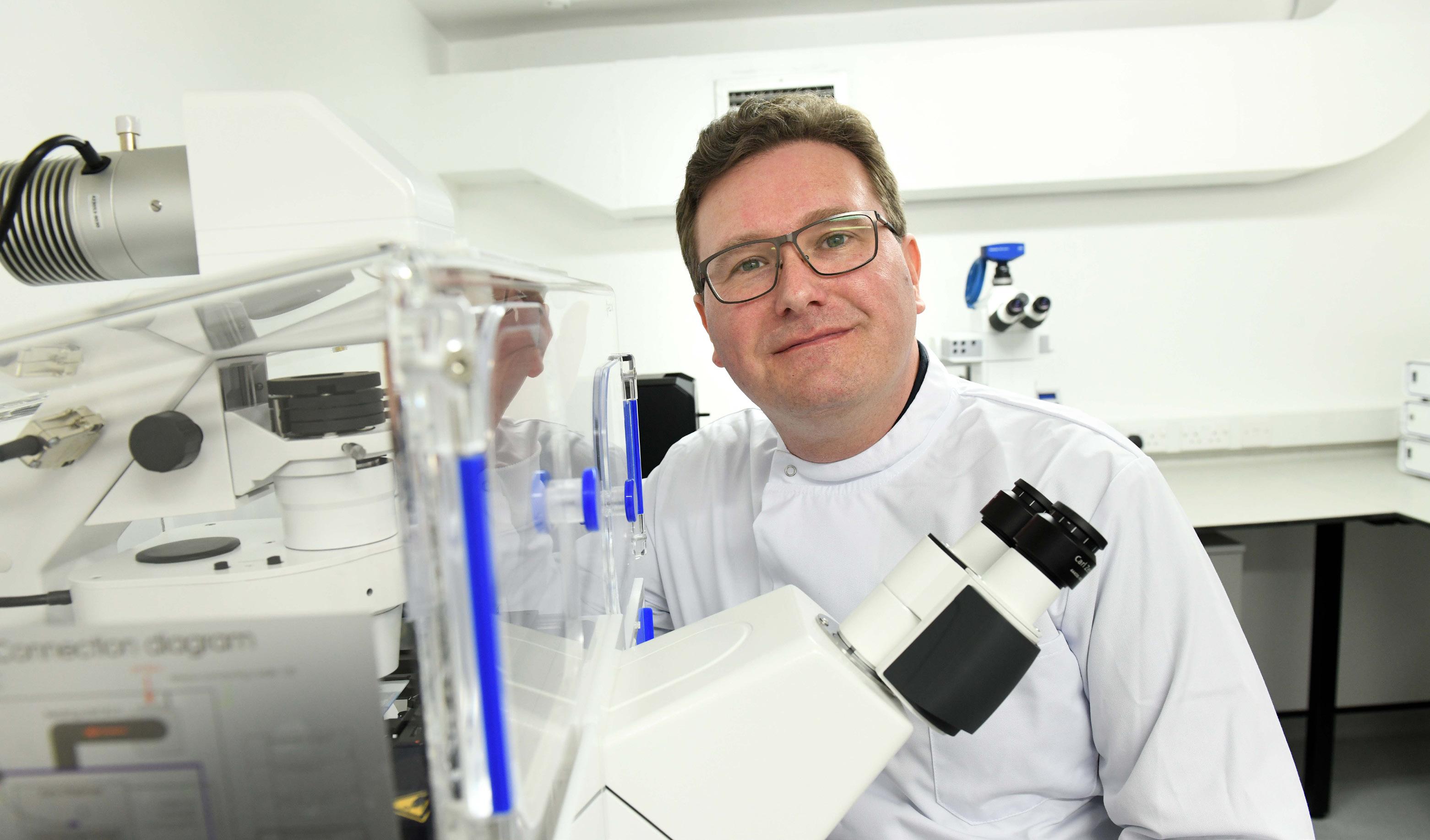
During the research the team will use special cells which have been created in a lab - known as human induced pluripotent stem cells (iPSC), which can be used to generate any type of human cell. Using this method, cells can be created at
different stages of development, allowing researchers to study the development of diseases and the effects of treatment at different stages.
Dr Hilgen’s team includes researchers from Northumbria University, Newcastle University, and the University of Tübingen in Germany. Commenting on the research, he said: “Our project is at the forefront of discovery and translational science. It uses innovative techniques of human iPSC models of AMD disease and a cutting-edge multidimensional approach. This award will help us study the different types of cellular mechanisms in human iPSC models of AMD, and how they work together. This will help us better understand AMD as well as find new ways to treat the disease.”
The Academy of Medical Sciences’ Springboard scheme offers a bespoke package of
support to biomedical researchers at the start of their first independent post to help launch their research careers. Professor Dianne Ford, Pro Vice-Chancellor of the Faculty of Health and Life Sciences at Northumbria University, said: “These awards are highly competitive and prestigious. The fact that Gerrit has secured this award is testament to the excellence of his research and clear future promise to become a leader in his field, as well as to the quality of the environment we offer at Northumbria for developing researchers. As Northumbria University’s Springboard Champion, I look forward to supporting the progress of Gerrit’s research, as well as that of our other talented researchers applying in future rounds.”
Dr Suzanne Candy, Director of Biomedical Grants & Policy at the Academy of Medical
Sciences, said: “Together with our partners, we are fortunate to be able to support this talented group of researchers doing excellent science. Our strategic ambition is to help create an open and progressive research sector. By investing in these individuals and teams, we are broadening the range of people and disciplines engaged in biomedical and health research, across all regions of the UK, and globally. We look forward to supporting our award recipients and seeing how their research has a positive impact on the health of people everywhere.”
Click the QR code to find out more about research from Northumbria’s Department of Applied Sciences.

28 Northumbria University NEWS • Summer 2023
DR GERRIT HILGEN, ASSISTANT PROFESSOR IN NEUROSCIENCE AT NORTHUMBRIA UNIVERSITY
A team of scientists led by a Northumbria University academic has won funding to research an eye disease which affects over 190 million people worldwide.
Fungi-based meat alternative may reduce bowel cancer risk
Northumbria University researchers have discovered that swapping red meat for Quorn’s mycoprotein, a fungi-based meat alternative, can lower the chances of getting bowel cancer by reducing intestinal genotoxins and increasing healthy gut bacteria.

The study, published in the European Journal of Nutrition, explored the effects of replacing a high red and processed meat intake with mycoprotein on the levels of cancer-causing chemicals found in the intestines, as well as the impact on gut health.
The randomised clinical trial followed 20 healthy male adults aged 18-50 and was split into two phases. The ‘meat phase’ saw trialists consume 240g of red and processed meat each day for a two-week period. During the ‘mycoprotein phase’ they consumed the same weight in fungi-derived mycoprotein equivalents over a separate two-week period, with a ‘washout’ period of four weeks between the two phases. Samples taken during the mycoprotein phase revealed that levels of detected genotoxins – known to be cancer-causing chemicals – were significantly
reduced. Conversely, results from the meat phase showed that genotoxin levels had risen, potentially increasing the longterm risk of bowel cancer.
The mycoprotein diet was found to significantly improve gut health by increasing the abundance of protective bacteria such as Lactobacilli, Roseburia, and Akkermansia, which can offer protection against chemically induced tumours, inflammation and bowel cancer.
Lead researcher Dr Daniel Commane, Associate Professor in Nutritional Sciences at Northumbria University, commented: “Bowel cancer is the fourth most common cancer in the UK, with more than 40,000 new cases each year, and data consistently associates red and processed meat consumption with increasing people’s risk.
“As previous studies had identified that reasons for this

enhanced risk include the fact that meat increases genotoxicity and, potentially, reduces fibre intake due to it commonly displacing plant foods, we wanted to explore the impact of switching meat for the fungibased mycoprotein when it came to bowel cancer risk. The study showed that this dietary change delivers a significant reduction in genotoxicity and an increase in beneficial gut microbes. Our findings suggest therefore that this high-fibre protein source provides a good alternative to meat in the context of gut health and could help to reduce long-term bowel cancer risk.”
Tim Finnigan, Scientific Advisor for Quorn Foods, said: “This latest study adds to the growing body of evidence that the nutritious protein source that is mycoprotein offers substantial health benefits, protecting against a range
of diseases and conditions. With official dietary advice encouraging everyone to consume less meat to improve the health of people and our planet, alternatives such as Quorn’s mycoprotein, which has an excellent nutrition profile, is really important. While many meat alternatives are plantbased, mycoprotein is fungibased which, emerging evidence suggests, brings a range of additional benefits to metabolic health.”
Academics from Northumbria’s Nutrition and Food Research Group are continuing to investigate the impact of mycoprotein on gut health, particularly focusing

on how the gut uses fibres in mycoprotein, such as chitin, beta glucan and mannan, and whether they might help train our immune systems or aid in lowering cholesterol levels.
This study is the latest to demonstrate how Quorn’s mycoprotein delivers significant health benefits, including appetite regulation for those with obesity and type 2 diabetes, muscle growth and reducing cholesterol levels.
29 #TakeOnTomorrow
Click the QR code to learn more about the study findings.
“BOWEL CANCER IS THE FOURTH MOST COMMON CANCER IN THE UK, WITH MORE THAN 40,000 NEW CASES EACH YEAR, AND DATA CONSISTENTLY ASSOCIATES RED AND PROCESSED MEAT CONSUMPTION WITH INCREASING PEOPLE’S RISK.”
DR DANIEL COMMANE
Left: Vegetarian chilli con carne made with Quorn’s mycoprotein
Harnessing the healing powers of the sea
Inspired by her seaside hometown of Whitley Bay, a Northumbria graduate entrepreneur has launched a range of marine-based skincare products, utilising sea extracts to improve the skin and boost self-confidence.


After taking a deep dive into the ingredients commonly used in skincare products, Marketing Management graduate, Annabelle Hill found they are often made with harsh chemicals which can be damaging to the environment. As someone who has had skincare concerns and is passionate about ocean conservation, Annabelle saw this as an opportunity to explore cleaner ways to improve people’s complexion.
One summer after spending a lot of time in the sea, Annabelle started noticing changes in her complexions, with her skin looking healthier and more radiant. This experience became the inspiration for a school assignment, which led to her drawing up a business plan for a skincare range. Several years later, after completing her degree, and with support from Northumbria’s Student and Graduate Enterprise team, she revisited this school project and launched her skincare brand Sea The Love.
Sea The Love uses sustainable and ethically sourced ingredients, including organic marine minerals and magnesium from the ocean. Each product in the range - which consists of a night cream, gel cleanser, serum and soon to launch day cream - is infused with marine plants such as seaweed and kelp, as well as clinical active ingredients such as hyaluronic acid and niacinamide. Importantly, these natural ingredients are known to have amazing benefits for
the skin, without the use of sulphates, parabens or silicones – which are unnatural products often found in skincare products and can have a negative impact on the environment.
As well as working to brighten, plump and hydrate the skin, it was important to Annabelle that the brand encourages people to feel confident. “Sea The Love was initially a set of products to help people like myself, who seek to improve their complexion and generally take better care of their skin. But it has grown so much since that first assignment”, Annabelle said. “It’s hard to ignore the
influence social media has on self-image. It was important to me that this was at the forefront of my brand, as improving your skin is only half of the solution. You have to love your natural self and be comfortable with your own reflection. Hence, Sea The Love.”
Sea the Love has commited to making a charitable donation with every purchase, supporting The Marine Conservation Society. And, recognising the amount of plastic waste which ends up in our oceans each year, the packaging has been designed to be recyclable and environmentally friendly, using
glass jars for all the products. Annabelle, who graduated in 2021, was recommended by a fellow graduate to speak with the University regarding support when launching her business. “I really hit the ground running once I returned to university to get help with my business,” she said. “I was surrounded by fantastic entrepreneurs, who were really starting to make a name for themselves and that gave me the hunger to get the job done. The support I have received so far has been incredible - I only wish I had met with the enterprise team sooner.”
Lee Longstaff, Enterprise Advisor at Northumbria University said: “It’s great to see Annabelle’s business idea become a reality. We love the ‘Sea the Love’ brand and we hope many more people do too”.
Click the QR code to find out more about the support available for student and graduate entrepreneurs.

30 Northumbria University NEWS • Summer 2023
ANNABELLE HILL, MARKETING MANAGEMENT GRADUATE AND FOUNDER OF SEA THE LOVE
“ THE SUPPORT I HAVE RECEIVED SO FAR HAS BEEN INCREDIBLE — I ONLY WISH I HAD MET WITH THE ENTERPRISE TEAM SOONER.”
Below: Seaweed Super Serum by Sea The Love
ANNABELLE HILL
Research reveals hopportunities for growth during pandemic for craft beer industry
“WE FOUND THAT IT WASN’T CHANGING BUSINESS STRATEGY THAT PUT BUSINESSES ON THE RIGHT FOOT TO MOVE FORWARD IN THE INITIAL STAGES OF THE CRISIS, BUT INDIVIDUAL ATTITUDES TO THE PANDEMIC — THOSE WHO FELT THE CRISIS WOULD PASS WERE LESS LIKELY TO MAKE INVESTMENTS DURING THE PERIOD, AND SLOWER TO INNOVATE.”
Since 2020 over 200 breweries across the UK have closed their doors, but two new studies led by Northumbria University academics show that despite the challenges breweries have faced the pandemic also provided opportunities for some to reinvent their businesses.

One study, published in academic journal Regional Studies, examines the UK craft beer industry before, during and after the Covid-19 pandemic, using a mix of quantitative and qualitative data from over 1,500 breweries. The research explored how UK craft breweries adapted and responded to the pandemic crisis and explains how location shaped, and indeed is still shaping, breweries’ strategies in a ‘new normal’ world.
During the pandemic, urban breweries were found to be more effective in securing support provided by the Government and in adapting to changes required by lockdowns and restriction to movements. Overall, rural breweries felt the impact of the crisis much more compared to breweries located in towns and
cities – reasons cited included their demand being concentrated in small catchment areas and being unable to gain additional support from national initiatives. Research lead, Professor Ignazio Cabras from Northumbria University’s Newcastle Business School, said: “Being located in an urban or rural area made a difference for breweries during the height of the pandemic. Urban breweries reacted more promptly to the crisis and adapted to changes faster than rural breweries.”
Professor of Rural Entrepreneurship at Northumbria, Dr Gary Bosworth, said: “We found that it wasn’t changing business strategy that put businesses on the right foot to move forward in the initial stages of the crisis, but individual attitudes to the pandemicthose who felt the crisis would pass were less likely to make investments during the period, and slower to innovate.”
A second study showed that independent craft brewers were able to weather the Covid pandemic by taking risks, embracing creativity and being innovative. Published in the International Journal of Entrepreneurial Behavior & Research, the study found that individual resilience by company leaders, is vital in managing the challenges of unexpected events, such as the pandemic. Researchers suggest that further studies are needed to understand the full extent of how impactful individual resilience is to achieve whole company resilience, but it was a clear factor in how craft breweries progressed through the pandemic.
The study also highlighted examples of innovation in the craft brewing industry that could be adopted going forward, such as a craft brewing company that offered free same-day local
delivery and collaborated with local venues for ‘tap takeovers’ –providing exposure for breweries in local pubs in exchange for free supplies of beer to be sold at the bar.
Dr Ekaterina Shakina, Assistant Professor at Newcastle Business School, said: “Covid-19 changed perspectives for craft breweries. Before the crisis, for instance, craft breweries tended to brew a much wider range of beers, however many refocused their efforts on core and flagship beers, cutting seasonal beers to achieve economies of scales.”
Ben Cleary, Founder of awardwinning Full Circle Brew Co, based in Newcastle, said: “As a brand-new start-up we launched our first batch of beer right as the pandemic hit, which had its positives and negatives. We moved all our production from keg to cans, set up a website within two weeks and launched ‘FCBC Now’ – our free sameday local delivery service. Export became a lifeline to us – by October 2020, export made up 70 per cent of our sales.

“Community engagement was also a key driver for us. As restrictions eased, we teamed up with some of the best North East craft beer bars, to launch our Full Circle North East Revival Tour, hosting tap takeover events at their venues.”
Professor Cabras added that the research team are interested in exploring how these adaptive responses might strengthen future business models, especially amid new challenges: “Smaller, independent businesses are now facing a new crisis with the cost of living rise, with the purchasing power of customers decreasing. At the same time the production costs are increasing, which leaves breweries with two options - to increase their prices to an unsustainable level for the customer or decrease an already tight profit margin.”
To read the full reports click the QR code.

31 #TakeOnTomorrow
Research led by Northumbria University has investigated the impact the pandemic had on UK breweries, revealing location and innovation as key factors shaping strategies for resilience and future growth in the craft beer sector.
DR GARY BOSWORTH
BEN CLEARY, FOUNDER OF FULL CIRCLE BREW CO
On your marks. Get set. Codebreak!
Northumbria University hosted 10 schools from across the region for the North East final of the 2023 CyberFirst Girls Competition, run by the National Cyber Security Centre (NCSC).
New technology to improve police interviews
School girls from across the North East went head-to-head in teams, taking on various cyber security challenges, in a bid to be named champions. The competition involved solving cyber-related puzzles based on topics such as artificial intelligence and cryptography. CyberFirst is a programme which offers young people the chance to explore their passion for technology by introducing them to the fast-paced world of cyber security. The Girls Competition is the NCSC’s flagship cyber security contest for schools, and since it launched in 2017, around 65,000 girls have taken part.
This year’s contest was entered by over 8,700 girls from England, Scotland, Wales and Northern Ireland. 13 finals took place simultaneously across the UK, each producing its own winner. At the North East event, Durham Johnston Comprehensive was crowned the winner.

Philip Anderson, Assistant Professor in Computer Networks and Security at Northumbria, said: “We were delighted to host this year’s final. It’s important that we look at ways to encourage and inspire young children into STEM careers and we were proud to welcome this year’s finalists onto campus for a fun day of codebreaking and cyber activities.”
Click the QR code to find out more about what Northumbria is doing to support children into STEM careers.
Researchers from Northumbria University have developed new software which will allow police and law enforcement officers to evaluate and improve their interview technique.
All police officers undergo indepth training on how to carry out interviews with victims, witnesses, and suspects of crime in a way that builds rapport and engagement – but research shows that these skills start to decline after a relatively short period of time.
In response, researchers at Northumbria University have developed the Forensic Interview Trace (FIT©) app, which will allow police officers, and anyone else carrying out interviews in a professional capacity, to continuously review and develop their technique to ensure they are getting the most out of their interviews, and asking questions in an effective and respectful way. Officers use the app to monitor how well their interviewee responds to each question, allowing them to look back at an interview and analyse how successful their questioning technique has been. The app also provides a visual representation of the responses, giving an at-aglance overview of the success of the interview.
The software has been developed by Assistant Professor of Psychology Dr Laura Farrugia and Professor of Police Science Gavin Oxburgh, both of Northumbria University; alongside Professor of Psychology Fiona Gabbert, of Goldsmiths, University of London.

As a Registered Intermediary, accredited by the Ministry of Justice, Dr Farrugia regularly works with vulnerable victims and witnesses, supporting them to give evidence to the police and to the court in criminal trials, and advising on best interview techniques and communication strategies. This experience, combined with her academic research in forensic psychology, gives her valuable insight into the importance of skilled interviewers.
As she explains: “We know that reflection is a great way to learn, and that taking the time to evaluate past interviews can help when planning future ones. The feedback we’ve had so far from the police officers piloting the FIT© software is that they are finding it a really valuable tool which is allowing them to get the best possible result from their
interviewees, while at the same time contributing to their own professional development.”
Also involved in the development of the FIT app© is Professor Oxburgh – a globally recognised expert in humane interview and interrogation techniques. He was recently part of an international steering committee tasked with exploring the immorality and ineffectiveness of torture.
He added: “We believe this technology has great potential, not just in supporting police officers in their roles, but in encouraging and supporting the use of internationally approved interview techniques, which respect the interviewees’ human rights. This is something which we take for granted in the UK, but which is still not a given in many countries around the world, and anything we can do to uphold professional interview standards is a positive step forward.”
Click the QR code to find out more about Northumbria’s Centre for Crime and Policing.


32 Northumbria University NEWS • Summer 2023
PROFESSOR GAVIN OXBURGH
PROFESSOR GAVIN OXBURGH AND DR LAURA FARRUGIA, PICTURED WITH THE FIT© APP
“ANYTHING WE CAN DO TO UPHOLD PROFESSIONAL INTERVIEW STANDARDS IS A POSITIVE STEP FORWARD.”
THE WINNING TEAM, DURHAM JOHNSTON COMPREHENSIVE
Understanding the impact of Ukrainian refugees in a changing Europe
Professor Cassidy is one of 10 new Senior Fellows appointed by the academic thinktank, UK in a Changing Europe (UKICE), which works to generate independent research on UK-European Union (EU) relations, the UK post-Brexit, and the UK’s place in the world. Her research, which has been awarded almost £370,000, will analyse how Poland, Romania and the UK responded to the displacement of people from Ukraine. Together with her research team, Professor Cassidy will work with policy-makers, organisations from the voluntary and community sector, host communities, and refugees from Ukraine living in all three countries.
The Russian invasion of Ukraine in 2022, and the related displacement of millions of people from their homes to other countries in Europe, prompted a range of responses from public debates and policymakers, including the removal of barriers to travel to, and settle in, countries across Europe.
Professor Cassidy’s three-year project entitled Debordering Europe through the 2022 Ukrainian Refugee Crisis: Analysis of Responses in the UK, Poland and Romania, will provide in-depth analysis of not only what these responses have been, but also what they mean for the UK in terms of its positioning and geopolitical relations with the EU and the rest of the world.
“This research will build upon work I have been carrying out since 2012 into everyday bordering - the embedding of border and immigration checks into everyday encounters - in the UK and its impacts on not just mobile people, but also public sector institutions and workers,” explained Professor Cassidy.“However, as well as extending this research to Poland and Romania, the fellowship will also enable me to draw upon
expertise in labour migration from communities in the UkrainianRomanian borderlands developed during my PhD.
“The expert support of the UKICE team will also offer me the opportunity to engage policymakers, the media and other nonacademic audiences in the findings of the research. The findings will be timely given not only the scale of the displacement but also that responses to accommodate and welcome people from Ukraine are counter to policy-making in a number of European countries in recent years, which has broadly sought to strengthen measures to exclude those seeking sanctuary.”
From 2019 to 2021, in research funded by the Leverhulme Trust, Professor Cassidy carried out analysis of bordering processes and practices, including a study of the institutionalisation of bordering within three different parts of the UK’s public sector: health care, higher education and social security.
“I am delighted that Kathryn has joined the UK in a Changing Europe team for what promises to be an exciting new phase in the life of the organisation,” said Anand Menon, Director of UKICE and Professor of European Politics and Foreign Affairs at King’s College London.
Professor Cassidy is a member of Northumbria’s Department of Geography and Environmental Sciences. Northumbria was recently ranked second in the UK for research power in Geography
and Environmental Studies, with over 90 per cent of research outputs rated as world-leading or internationally excellent in the 2021 Research Excellence Framework.
For full details of the research projects being pursued by the other UKICE Senior Fellows, click the QR code.

“THE FINDINGS WILL BE TIMELY GIVEN NOT ONLY THE SCALE OF THE DISPLACEMENT BUT ALSO THAT RESPONSES TO ACCOMMODATE AND WELCOME PEOPLE FROM UKRAINE ARE COUNTER TO POLICYMAKING IN A NUMBER OF EUROPEAN COUNTRIES IN RECENT YEARS, WHICH HAS BROADLY SOUGHT TO STRENGTHEN MEASURES TO EXCLUDE THOSE SEEKING SANCTUARY.”

33 #TakeOnTomorrow
Political Geographer, Professor Kathryn Cassidy, has won a prestigious fellowship award for her research into the displacement of people since the beginning of the 2022 invasion of Ukraine by Russia.
PROFESSOR
KATHRYN CASSIDY
National approach needed for international research collaborations

The report was produced for Research England, part of UK Research and Innovation (UKRI), responsible for funding and engaging with English higher education providers and oversees UKRI’s functions in relation to university research and knowledge transfer.
The report was led by Jennifer Johnson, Director of Research and Innovation Services at Northumbria and chair of the Association of Research Managers and Administrators (ARMA). ARMA is the professional association for research management in the UK and works with national and international bodies to influence and understand the changing research management agenda, to promote public trust in research, as well as to provide professional development opportunities.
In May last year, Research England awarded ARMA almost £100,000 to explore the current challenges facing the higher education sector in international research collaborations, particularly around issues relating to risk assurance, due diligence, trusted research and security. To address unmet needs and drive cultural change in
international research activity, the Complex Collaborations – Efficiency, Equity, Quality and Security in International Research report recommends the creation of a Research Collaboration Diligence Exchange and System, alongside a series of quick-win practical solutions, such as improvements to guidance and training resources.
Jennifer Johnson explained: “This project set out with the aim of understanding the current challenges facing the sector in relation to due diligence and security and to assess whether a national system and service for due diligence remained part of the solution. Our report demonstrates that the sector is facing a complex legislative landscape and unique challenges in this space and whilst I am left in no doubt that as a sector, we can do better, there is an overwhelming need for the creation of national provision and capacity to support due diligence and security in international research.
“International collaborations are an essential feature of research activity. As Director of Research and Innovation Services at Northumbria University,

I am well aware of the challenges relating to the complexity and cross-cutting nature of the legislation that colleagues face when establishing projects. I look forward to seeing our recommendations improve practice for universities across the UK.”
Professor Dame Jessica Corner, Executive Chair at Research England said: “We are grateful to ARMA for their practical and thoughtful report. Continued dialogue across sectors, with government, in the UK, and internationally is critical to successful implementation in delivering trusted research.

“We must continue to share experiences and best practices; to identify what is working, and where greater attention might be needed. ARMA has prompted a significant discussion that will promote engagement at all levels with this important agenda.” Visit
“I AM WELL AWARE OF THE CHALLENGES RELATING TO THE COMPLEXITY AND CROSS-CUTTING NATURE OF THE LEGISLATION THAT COLLEAGUES FACE WHEN ESTABLISHING PROJECTS. I LOOK FORWARD TO SEEING OUR RECOMMENDATIONS IMPROVE PRACTICE FOR UNIVERSITIES ACROSS THE UK.”
JENNIFER JOHNSON
34 Northumbria University NEWS • Summer 2023
the ARMA website for full details on the report and its recommendations.
Experts from Northumbria University have published a report outlining the need for a sector-led approach for international research projects.
Northumbria graduate aims high in Archery World Cup
Five-times winners
Northumbria University’s Rugby League Men’s First Team were victorious at the British Universities & Colleges Sport (BUCS) Wednesday tournament winning the National Championship title for the fifth year in a row.
Having successfully competed in the first two stages of the World Cup, Alex made it through to the third stage of competition which took place in June in Medellin, Colombia. Held annually, the competition sees the world’s finest archers compete throughout four stages, with the aim of securing a place in the World Cup final, held this September in Hermosillo, Mexico.
Alex, 22, currently ranks 84th in the world for Men’s Recurve, a popular style of archery which uses the recurve bow – the modern evolution of traditional archery bows that have existed for thousands of years and are extensively used in competitions throughout the world, including the Olympic Games.

Having started his archery journey in 2015 at age 14, Alex enrolled onto Northumbria’s Sport Development degree programme in 2019. On his programme, Alex was able to gain an understanding of the distinctive needs of international sports organisations, whilst developing vocationally relevant experience. Alongside his studies, Alex had access to world-class facilities, including Northumbria’s Sport Central, a £30 million sports facility providing hundreds of student athletes with a state-of-the-art base for
competing and training.
Speaking about his degree programme, Alex said: “I was lucky enough to be awarded a scholarship from Northumbria to support me in my archery career which gave me full access to the sporting facilities.
said: “It was very important I selected a university that was understanding of my busy, and often hectic archery commitments. At Northumbria I was given flexibility around my studies, so I was able to continue with any archery training and competitions. I can honestly say I wouldn’t be at the professional level I am at today without the support I was offered and access to such fantastic facilities.”
Whilst studying at Northumbria, Alex went on to receive a number of archery accolades, including being named Young Sporting Success of the Year 2022 at Sport Newcastle’s annual awards. He broke two national records during the 2021 outdoor season, whilst also winning the British Target Championships. Having graduated from Northumbria in 2022, Alex is in full-time training as a professional archer but is considering continuing his academic studies at Northumbria on a postgraduate degree programme in the near future.
Following an 80-minute, nail-biting performance, Northumbria’s First Team players were crowned National Champions, beating Leeds Beckett University 14-10. The team won the same title in 2017, 2018, 2019 and 2022, with no tournaments taking place in 2020 and 2021 due to the Coronavirus pandemic.

Commenting on this incredible achievement, Jason Payne, Head of Rugby League at Northumbria, said: “Winning the National Championship after suffering two defeats to Leeds Beckett earlier in the season was special. The players always work incredibly hard, some having to juggle university sport, academia, professional club commitments and work alongside everything else that life throws at us. The belief and resilience in the group and continuous hunger to drive the programme forward year on year is remarkable.”
The gym facilities and equipment in particular were excellent for helping to prevent injury and improve my foundational fitness. They really complemented my archery training.”
On choosing to study a degree programme at Northumbria, Alex
Scan the QR code to discover more about sport degree programmes and facilities at Northumbria.
The nature of university sport means that every year there is a huge turnover of players, so the team needed to step-up their game and work even harder to retain their winning streak. Jake Lightowler, Captain of the Men’s Rugby Team stated: “I’m immensely proud to have captained this side as I’ve seen how hard the lads have worked and what they have sacrificed to get here. Both the first team and the second team have contributed to the continued success of Northumbria Rugby League this year and hopefully it continues long into the future.”
To find out more about sport at Northumbria please click the QR code.


35 #TakeOnTomorrow SPORT
NORTHUMBRIA MEN’S FIRST RUGBY TEAM WINNING THE BUCS NATIONAL CHAMPIONSHIPS AGAINST LEEDS BECKETT
Northumbria Sport Development graduate Alex Wise joined a team of elite archers representing Great Britain in the third round of the 2023 Hyundai Archery World Cup.
ALEX WISE. IMAGE COURTESY OF WORLD ARCHERY
Northumbria lecturer supports Team GB at Special Olympics
Dr Daniel Monk, an Assistant Professor in Nursing at Northumbria University was appointed as Medical Officer for Team Special Olympics Great Britain at the Special Olympics World Games.
Special Olympics Great Britain is a non-profit organisation and the largest provider of year-round sports training and athletic competition for children and adults of all abilities with intellectual disabilities.
The Special Olympics World Games took place in Berlin between 17-25 June and is the world’s largest inclusive sporting event. More than 7,000 athletes with intellectual disabilities competed in 26 sports including athletics, swimming, cycling and unified football.
As Medical Officer, Dr Monk took lead medical responsibility for more than 80 athletes competing across 17 sports. During the Games, his role was
to implement the plans and activities put in place to manage the health and well-being of delegation members, including medication administration and education, and support for coaches and staff. He also worked with doctors and nurses to provide guidance and direction if any injuries are sustained during the games.
A registered Nurse, Dr Monk spent the early part of his career working in a variety of urgent care facilities in the North East, before moving to Northumbria University, where he specialises in teaching students about emergency, urgent and unplanned care from a clinical, professional, patient and managerial perspective. He also

teaches and delivers continuing professional development programmes for qualified nurses and healthcare workers. Dr Monk’s background in medicine and care, and a desire to work with under-represented individuals, prompted him to apply for the voluntary role last year. Following a comprehensive interview process, he was delighted to be selected as Team Special Olympics GB’s Medical Officer. Speaking about his key role, Dr Monk said: “This has been such an exciting opportunity for me personally and professionally. Working within a fantastic and highly experienced team to deliver support for a truly inspirational event, it’s a
privilege to help the athletes be the best they can be.”


Laura Davies, Head of Projects & Events at Special Olympics GB and part of the Delegation Management Team for Berlin 2023, said: “Competing at a Special Olympics World Games is often a lifechanging opportunity for our athletes, but it is only possible because of the

incredible support of volunteers like Dr Monk who gave up their time to provide such great support.
“We’re incredibly grateful to him for coming into this role as our Team Special Olympics GB Medical Officer and we also thank Northumbria University for enabling him to take up this role and support our athletes.”
Issue 29 Summer 2023 • northumbria.ac.uk
DR DANIEL MONK
Click the QR code to discover more about Northumbria’s Department of Nursing, Midwifery and Health. Click the QR code to discover more about Northumbria Sport.
“IT’S A PRIVILEGE TO HELP THE ATHLETES BE THE BEST THEY CAN BE.”




































































































































